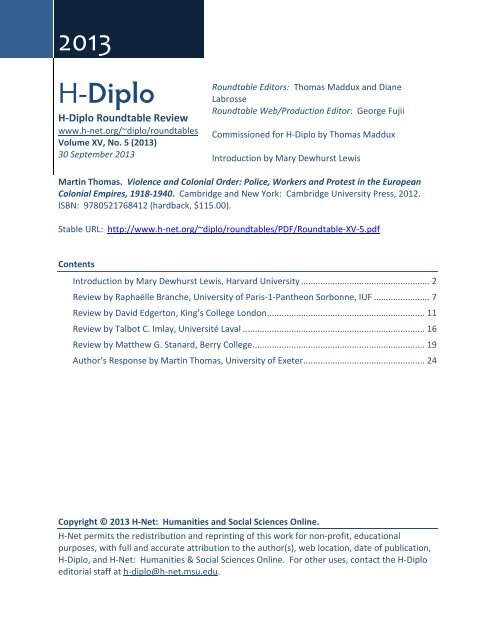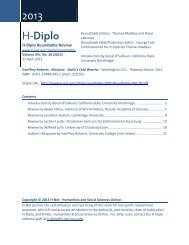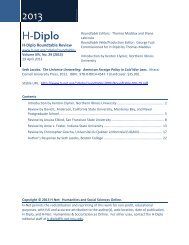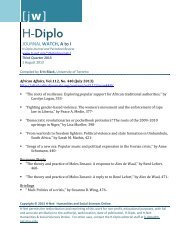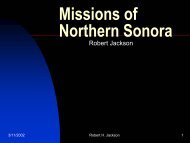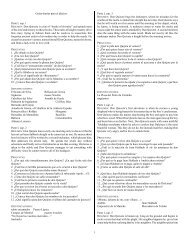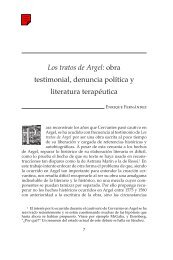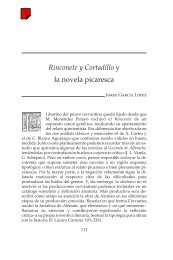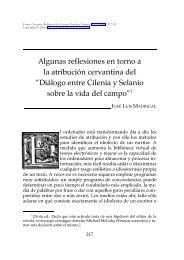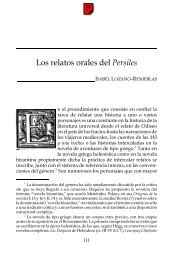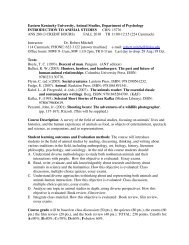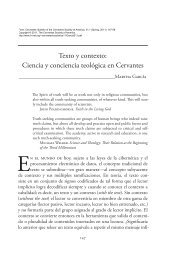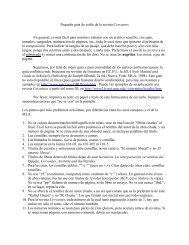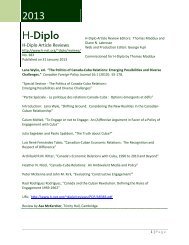H-Diplo Roundtable on Martin Thomas. Violence and ... - H-Net
H-Diplo Roundtable on Martin Thomas. Violence and ... - H-Net
H-Diplo Roundtable on Martin Thomas. Violence and ... - H-Net
Create successful ePaper yourself
Turn your PDF publications into a flip-book with our unique Google optimized e-Paper software.
2013<br />
H-<str<strong>on</strong>g>Diplo</str<strong>on</strong>g><br />
H-<str<strong>on</strong>g>Diplo</str<strong>on</strong>g> <str<strong>on</strong>g>Roundtable</str<strong>on</strong>g> Review<br />
www.h-net.org/~diplo/roundtables<br />
Volume XV, No. 5 (2013)<br />
30 September 2013<br />
<str<strong>on</strong>g>Roundtable</str<strong>on</strong>g> Editors: <strong>Thomas</strong> Maddux <strong>and</strong> Diane<br />
Labrosse<br />
<str<strong>on</strong>g>Roundtable</str<strong>on</strong>g> Web/Producti<strong>on</strong> Editor: George Fujii<br />
Commissi<strong>on</strong>ed for H-<str<strong>on</strong>g>Diplo</str<strong>on</strong>g> by <strong>Thomas</strong> Maddux<br />
Introducti<strong>on</strong> by Mary Dewhurst Lewis<br />
<strong>Martin</strong> <strong>Thomas</strong>. <strong>Violence</strong> <strong>and</strong> Col<strong>on</strong>ial Order: Police, Workers <strong>and</strong> Protest in the European<br />
Col<strong>on</strong>ial Empires, 1918-1940. Cambridge <strong>and</strong> New York: Cambridge University Press, 2012.<br />
ISBN: 9780521768412 (hardback, $115.00).<br />
Stable URL: http://www.h-net.org/~diplo/roundtables/PDF/<str<strong>on</strong>g>Roundtable</str<strong>on</strong>g>-XV-5.pdf<br />
C<strong>on</strong>tents<br />
Introducti<strong>on</strong> by Mary Dewhurst Lewis, Harvard University ..................................................... 2<br />
Review by Raphaëlle Branche, University of Paris-1-Panthe<strong>on</strong> Sorb<strong>on</strong>ne, IUF ....................... 7<br />
Review by David Edgert<strong>on</strong>, King’s College L<strong>on</strong>d<strong>on</strong> ................................................................. 11<br />
Review by Talbot C. Imlay, Université Laval ........................................................................... 16<br />
Review by Matthew G. Stanard, Berry College ....................................................................... 19<br />
Author’s Resp<strong>on</strong>se by <strong>Martin</strong> <strong>Thomas</strong>, University of Exeter .................................................. 24<br />
Copyright © 2013 H-<strong>Net</strong>: Humanities <strong>and</strong> Social Sciences Online.<br />
H-<strong>Net</strong> permits the redistributi<strong>on</strong> <strong>and</strong> reprinting of this work for n<strong>on</strong>-profit, educati<strong>on</strong>al<br />
purposes, with full <strong>and</strong> accurate attributi<strong>on</strong> to the author(s), web locati<strong>on</strong>, date of publicati<strong>on</strong>,<br />
H-<str<strong>on</strong>g>Diplo</str<strong>on</strong>g>, <strong>and</strong> H-<strong>Net</strong>: Humanities & Social Sciences Online. For other uses, c<strong>on</strong>tact the H-<str<strong>on</strong>g>Diplo</str<strong>on</strong>g><br />
editorial staff at h-diplo@h-net.msu.edu.
H-<str<strong>on</strong>g>Diplo</str<strong>on</strong>g> <str<strong>on</strong>g>Roundtable</str<strong>on</strong>g> Reviews, Vol. XV, No. 5 (2013)<br />
Introducti<strong>on</strong> by Mary Dewhurst Lewis, Harvard University<br />
A<br />
ny teacher of European imperial history probably has given some versi<strong>on</strong> of a<br />
lecture suggesting that World War II c<strong>on</strong>tributed to the end of empire. The<br />
argument goes something like this: the Allied victory over the Nazis delegitimized<br />
racist empire as a form of governance. Moreover, because Japan had occupied much of the<br />
British, Dutch, <strong>and</strong> French Empires in Southeast Asia during the war, col<strong>on</strong>ized subjects<br />
realized that the racial hierarchies buttressing European imperialism could be upended;<br />
this encouraged them to push back against European rec<strong>on</strong>quest after Japan’s retreat.<br />
Finally, there was the fiscal questi<strong>on</strong>: European imperial powers after the war were totally<br />
broke, <strong>and</strong> to spend m<strong>on</strong>ey <strong>on</strong> shoring up the empire at a time when citizens in the<br />
metropole still faced rati<strong>on</strong>ing of key foodstuffs was politically risky. As a result, European<br />
governments – especially Britain <strong>and</strong> France – cut loose their imperial holdings in some<br />
places <strong>and</strong>, in others, sought to remake empire by creating ‘comm<strong>on</strong>wealths’ intended to<br />
bind col<strong>on</strong>ial subjects to the metropole in a looser form of imperial c<strong>on</strong>trol.<br />
In his new book, <strong>Violence</strong> <strong>and</strong> Col<strong>on</strong>ial Order: Police, Workers <strong>and</strong> Protest in the European<br />
Col<strong>on</strong>ial Empires, 1918-1940, <strong>Martin</strong> <strong>Thomas</strong> suggests that empire ended a different way.<br />
First, he changes our chr<strong>on</strong>ology, arguing that the Great Depressi<strong>on</strong> catalyzed imperial<br />
change before the war did. Sec<strong>on</strong>d, like Frederick Cooper, whose magisterial<br />
Decol<strong>on</strong>izati<strong>on</strong> <strong>and</strong> African Society showed how the combinati<strong>on</strong> of political <strong>and</strong> ec<strong>on</strong>omic<br />
dem<strong>and</strong>s of African laborers after the Sec<strong>on</strong>d World War made empire in Africa too<br />
expensive to maintain for Britain <strong>and</strong> France alike, 1 <strong>Thomas</strong> suggests that political<br />
ec<strong>on</strong>omy, rather than political ideology, lay at the heart of the end of empire. The ec<strong>on</strong>omic<br />
crisis was important because it laid bare the extractive underpinnings up<strong>on</strong> which almost<br />
all European imperial endeavors were based. As is well known, the Depressi<strong>on</strong> began as an<br />
agricultural crisis <strong>and</strong> then spread to other sectors of the ec<strong>on</strong>omy. Col<strong>on</strong>ial ec<strong>on</strong>omies<br />
were profoundly affected by the Depressi<strong>on</strong> because they were driven, to a very great<br />
extent, by the extracti<strong>on</strong> of primary resources such as minerals <strong>and</strong> oil or the cultivati<strong>on</strong> of<br />
agricultural products such as rubber plants or groundnuts. With commodity prices falling<br />
<strong>and</strong> markets shrinking, col<strong>on</strong>ial enterprises – which had always engaged in coercive labor<br />
practices – ratcheted up the level of coerci<strong>on</strong> <strong>and</strong> c<strong>on</strong>trol while squeezing wages. Col<strong>on</strong>ial<br />
police, who formally worked for the state but who saw a c<strong>on</strong>necti<strong>on</strong> between col<strong>on</strong>ial<br />
enterprise <strong>and</strong> the future of that state, frequently were called in as the h<strong>and</strong>-maidens of<br />
imperial capitalist enterprise. (But they were also caught between a rock <strong>and</strong> hard place<br />
because col<strong>on</strong>ial state leaders often understood that labor reform was essential to<br />
maintaining col<strong>on</strong>ial peace; <strong>Thomas</strong> illustrates this paradox nicely). In <strong>Thomas</strong>’s account,<br />
repressi<strong>on</strong> of workers was often quite brutal <strong>and</strong> sometimes fueled anti-col<strong>on</strong>ial<br />
nati<strong>on</strong>alism, which in turn was repressed with still more violence. But nati<strong>on</strong>alism, for<br />
<strong>Thomas</strong>, is not the main story.<br />
1 Frederick Cooper, Decol<strong>on</strong>izati<strong>on</strong> <strong>and</strong> African Society: The Labor Questi<strong>on</strong> in French <strong>and</strong> British<br />
Africa (Cambridge: Cambridge University Press, 1996).
H-<str<strong>on</strong>g>Diplo</str<strong>on</strong>g> <str<strong>on</strong>g>Roundtable</str<strong>on</strong>g> Reviews, Vol. XV, No. 5 (2013)<br />
The reviewers take different less<strong>on</strong>s from this c<strong>on</strong>clusi<strong>on</strong>: Raphaëlle Branche finds that<br />
“<strong>on</strong>e of the major c<strong>on</strong>tributi<strong>on</strong>s of <strong>Thomas</strong>’s work lies in clearly identifying the turning<br />
points where, in order to survive, the col<strong>on</strong>ial orders had to become more flexible <strong>and</strong> the<br />
police had to adapt.” It is interesting that Branche, a historian of the illegal torture tactics<br />
that were deployed by the French army in Algeria between 1954 <strong>and</strong> 1962 (hardly an<br />
instance of policing becoming more flexible), 2 interprets <strong>Violence</strong> <strong>and</strong> Col<strong>on</strong>ial Order this<br />
way, while Talbot Imlay c<strong>on</strong>cludes that the “ec<strong>on</strong>omic crisis … made it clear that as a<br />
political-ec<strong>on</strong>omic system, European imperialism was unviable.” Could it be reformed or<br />
was it doomed to fail? These differing interpretati<strong>on</strong>s point, I think, to the sheer volume of<br />
examples <strong>Thomas</strong> provides, not all of which lend themselves to the same c<strong>on</strong>clusi<strong>on</strong>s. In<br />
some places, intensive policing helped increase profits; in others, it backfired. <strong>Thomas</strong><br />
might have d<strong>on</strong>e more to explain when <strong>and</strong> why police brutality achieved its goals or<br />
became “routine” (100) <strong>and</strong> why it was counterproductive in others. As Imlay asks, “were<br />
some col<strong>on</strong>ial police forces more active or complicit in the repressi<strong>on</strong> of worker unrest<br />
than others?” <strong>Thomas</strong> offers a clue in his subtle treatment of Michelin’s power in col<strong>on</strong>ial<br />
Vietnam, as he deftly analyzes the growing estrangement between the col<strong>on</strong>ial state <strong>and</strong><br />
the rubber tire business; but this nuance is not brought to every example.<br />
How could it be? As this forum’s reviewers have observed, <strong>Violence</strong> <strong>and</strong> Col<strong>on</strong>ial Order is<br />
immense in its scope <strong>and</strong> eruditi<strong>on</strong>. <strong>Thomas</strong> ably compares <strong>and</strong> c<strong>on</strong>trasts cases as<br />
different as oil fields in Tobago <strong>and</strong> rubber plantati<strong>on</strong>s in Indochina. The work is driven by<br />
original empirical research but also dem<strong>on</strong>strates an impressive grasp of the relevant<br />
sec<strong>on</strong>dary literature. Coming just five years after his superb analysis of col<strong>on</strong>ial<br />
intelligence gathering, Empires of Intelligence (2007), <strong>on</strong>e cannot help but marvel at how he<br />
has managed to produce another ambitious <strong>and</strong> original work at such a clip. Surely it is the<br />
hallmark of a provocative work that each of the reviewers wanted more: Matthew Stanard<br />
w<strong>on</strong>ders what the story would have looked like with British India or the Soviet l<strong>and</strong> empire<br />
in the mix, though he calls his questi<strong>on</strong> “facetious” since he recognizes the feat <strong>Thomas</strong> has<br />
pulled off. David Edgert<strong>on</strong>, observing that police got involved in industrial disputes in<br />
metropolitan centers, too, wants to know more about how “management, work<br />
organizati<strong>on</strong>, <strong>and</strong> internal policing differ[ed] between the col<strong>on</strong>ial <strong>and</strong> rich worlds.”<br />
Branche speculates that a “closer analysis of the gestures of violence that were ordered,<br />
selected, <strong>and</strong> ultimately carried out” might nuance <strong>Thomas</strong>’s argument about the police as<br />
“outsiders.” Imlay w<strong>on</strong>ders what would happen if <strong>on</strong>e compared <strong>Thomas</strong>’s case studies to<br />
the very repressive <strong>and</strong> yet “successful” empires (in terms of l<strong>on</strong>gevity), such as the<br />
Portuguese empire in Africa. I myself w<strong>on</strong>dered why he had not included Kenya, where<br />
exploitati<strong>on</strong> of wage labor in the 1920s <strong>and</strong> 1930s set the stage for the later Mau Mau<br />
uprising. 3 <strong>Thomas</strong>’s analysis also leaves <strong>on</strong>e w<strong>on</strong>dering why the most egregious acts of<br />
2001).<br />
2 Raphaëlle Branche, La Torture et l’armée pendant la guerre d’Algérie, 1954-1962 (Paris: Gallimard,<br />
3 David Anders<strong>on</strong>, Histories of the Hanged: The Dirty War in Kenya <strong>and</strong> the End of Empire (New<br />
York: Nort<strong>on</strong>, 2005); Caroline Elkins, Imperial Reck<strong>on</strong>ing: The Untold Story of Britain’s Gulag in Kenya (New<br />
York: Henry Holt, 2004).<br />
3 | P age
H-<str<strong>on</strong>g>Diplo</str<strong>on</strong>g> <str<strong>on</strong>g>Roundtable</str<strong>on</strong>g> Reviews, Vol. XV, No. 5 (2013)<br />
col<strong>on</strong>ial violence often seemed disc<strong>on</strong>nected from ec<strong>on</strong>omic c<strong>on</strong>cerns. 4 The Algerian War<br />
remains the quintessential example of col<strong>on</strong>ial violence (<strong>and</strong> counter-violence), but <strong>on</strong>e<br />
would be hard-pressed to argue that its underpinnings were primarily ec<strong>on</strong>omic (even if<br />
oil was discovered in the Sahara part way through the war, making the resoluti<strong>on</strong> of the<br />
war more difficult). Some brief discussi<strong>on</strong> of the cases that were not included might have<br />
helped clarify the argument <strong>and</strong> its scope.<br />
This quibbling about cases aside, the reviewers agree that the return to what <strong>Thomas</strong> calls<br />
“political ec<strong>on</strong>omy” is a fruitful shift away from the cultural analyses of power that have<br />
dominated the “New Imperial History” <strong>and</strong> postcol<strong>on</strong>ial studies in the past few decades. 5<br />
In 2003, Stuart Ward predicted that growing interest in globalizati<strong>on</strong> would allow “the field<br />
of ‘imperial history’ to stage a major comeback, reclaiming ground that had been lost<br />
during the proliferati<strong>on</strong> of area studies.” 6 In short order, we had books like Niall<br />
Fergus<strong>on</strong>’s Empire <strong>and</strong>, from a different political perspective, John Darwin’s After<br />
Tamerlane, which explicitly c<strong>on</strong>nected imperialism <strong>and</strong> globalizati<strong>on</strong>. 7 By making political<br />
ec<strong>on</strong>omy central to his thesis, <strong>Thomas</strong> joins this trend. Yet by c<strong>on</strong>centrating <strong>on</strong> policing, he<br />
takes it in a fresh directi<strong>on</strong> that builds thematically – albeit not methodologically – <strong>on</strong> the<br />
attenti<strong>on</strong> paid by postcol<strong>on</strong>ial studies to questi<strong>on</strong>s of inequality <strong>and</strong> exploitati<strong>on</strong>. Still, like<br />
other materialist historians of imperialism, <strong>Thomas</strong> expressly aims to paint a very big<br />
picture of empire by looking comparatively within <strong>and</strong> across imperial systems. One of the<br />
dangers of this broad scope, of course, is the potential to lose sight of the people living<br />
under imperial rule. These individuals are present in <strong>Thomas</strong>’s work, but mostly they are<br />
the people whose ec<strong>on</strong>omic lives are policed; more political agency is given, in many<br />
instances, to the companies that employed them than to the rebellious workers themselves.<br />
That may accurately reflect the power differential in col<strong>on</strong>ial ec<strong>on</strong>omic life, but, as Stanard<br />
observes, “[t]his is not an archaeology of col<strong>on</strong>ial violence as experienced by those <strong>on</strong> the<br />
receiving end.”<br />
4 As Benjamin Brower observes, the Sahara at the time of the brutal “first” French-Algerian war in the<br />
nineteenth century was a “l<strong>and</strong> with no dem<strong>on</strong>strated ec<strong>on</strong>omic or strategic value.” Benjamin Claude Brower,<br />
A Desert Named Peace: The <strong>Violence</strong> of France’s Empire in the Algerian Sahara, 1844–1902 (New York:<br />
Columbia University Press, 2009), 9, 43. One could make a similar argument about German Southwest Africa,<br />
the site of the world’s first “genocide.” See Isabel Hull, Absolute Destructi<strong>on</strong>: Military Culture <strong>and</strong> the<br />
Practices of War in Imperial Germany (Ithaca, NY: Cornell University Press, 2006).<br />
5 The work that can be described as fitting within the “New Imperial History” is too vast to cite in its<br />
entirety here. The argument for the “new imperial history” is outlined by Kathleen Wils<strong>on</strong>, ed., A New<br />
Imperial History: Culture, Identity, <strong>and</strong> Modernity in Britain <strong>and</strong> the Empire, 1660–1840 (Cambridge:<br />
Cambridge University Press, 2004), 1–26. Scholarship in the “new imperial history” builds <strong>on</strong> the insights of<br />
“postcol<strong>on</strong>ial studies.” Both are greatly indebted to Edward Said’s Orientalism (New York: Panthe<strong>on</strong> Books,<br />
1978).<br />
6 Stuart Ward, “Transcending the Nati<strong>on</strong>: A Global Imperial History?” in Antoinette Burt<strong>on</strong>, ed., After<br />
the Imperial Turn: Thinking with <strong>and</strong> through the Nati<strong>on</strong> (Durham, NC: Duke University Press, 2003), 52.<br />
7 Niall Fergus<strong>on</strong>, Empire: The Rise <strong>and</strong> Demise of the British World Order <strong>and</strong> the Less<strong>on</strong>s for Global<br />
Power (New York: Basic Books, 2003); John Darwin, After Tamerlane: The Global History of Empire since<br />
1405 (New York: Bloomsbury, 2008).<br />
4 | P age
H-<str<strong>on</strong>g>Diplo</str<strong>on</strong>g> <str<strong>on</strong>g>Roundtable</str<strong>on</strong>g> Reviews, Vol. XV, No. 5 (2013)<br />
I agree, but this is not unusual for <strong>Thomas</strong>, whose trademark approach has been to focus <strong>on</strong><br />
patterns of human behavior (or misbehavior), rather than <strong>on</strong> individuals. This was evident<br />
in Empires of Intelligence, which dem<strong>on</strong>strated that incorrect assumpti<strong>on</strong>s about<br />
communist agitati<strong>on</strong>, the appeal of pan-Islam, or col<strong>on</strong>ized people’s political aptitudes<br />
colored intelligence <strong>and</strong> misled col<strong>on</strong>ial governments. <strong>Thomas</strong> has also been in the<br />
forefr<strong>on</strong>t of comparative imperial history. This is particularly welcome for a field of<br />
scholarship that, while vast in territorial scope, has been oddly insular – especially in the<br />
modern era – in its focus <strong>on</strong> single empires as if they were coherent entities. By comparing<br />
empires, particularly those of the British <strong>and</strong> French, <strong>Thomas</strong> highlights the c<strong>on</strong>tinuities<br />
between two powers whose imperial styles are so often c<strong>on</strong>trasted as well as fissures<br />
within each of these empires. Indeed, <strong>Thomas</strong> joins Frederick Cooper as <strong>on</strong>e of the few<br />
scholars actively bringing the French empire into a c<strong>on</strong>versati<strong>on</strong> about imperial power as<br />
part of a broader modern world system. This is not to say that there are not plenty of<br />
erudite works <strong>on</strong> French col<strong>on</strong>ialism in particular places or that compare different<br />
outposts of the French empire. But there are few works covering the modern era that<br />
integrate French col<strong>on</strong>ial history into a world history of imperialism. <strong>Thomas</strong>’s work does<br />
that, <strong>and</strong> it does so in a way that should be of interest to historians of all modern empires,<br />
as well as their c<strong>on</strong>stituent parts. The trend toward “big” imperial history need not<br />
supplant area studies at all but can draw <strong>on</strong> <strong>and</strong>, hopefully, foster them.<br />
Participants:<br />
<strong>Martin</strong> <strong>Thomas</strong> is Professor of European Imperial History <strong>and</strong> Director of the Centre for<br />
War, State, <strong>and</strong> Society at the University of Exeter. He has written extensively <strong>on</strong> col<strong>on</strong>ial<br />
politics <strong>and</strong> patterns of dissent, including Empires of Intelligence: Security Services <strong>and</strong><br />
Col<strong>on</strong>ial C<strong>on</strong>trol after 1914 (Berkeley: University of California Press, 2007) <strong>and</strong>, with Bob<br />
Moore <strong>and</strong> L.J. Butler, Crises of Empire. Decol<strong>on</strong>izati<strong>on</strong> <strong>and</strong> Europe’s Imperial States, 1918-<br />
1975 (L<strong>on</strong>d<strong>on</strong>: Bloomsbury Academic, 2008) He is currently completing a comparative<br />
study of French <strong>and</strong> British decol<strong>on</strong>isati<strong>on</strong>, Fight or Flight: France, Britain <strong>and</strong> their Roads<br />
from Empire to be published with Oxford University Press in 2014.<br />
Mary Dewhurst Lewis is Professor of History at Harvard University. Her first book,<br />
The Boundaries of the Republic: Migrant Rights <strong>and</strong> the Limits of Universalism in France,<br />
1918-1940, was published by Stanford University Press in 2007 <strong>and</strong> translated into French<br />
by Éditi<strong>on</strong>s Ag<strong>on</strong>e in 2010. Her sec<strong>on</strong>d book, Divided Rule: Sovereignty <strong>and</strong> Empire in<br />
French Tunisia, 1881-1938, is forthcoming in November 2013 from the University of<br />
California Press. She is currently in the early stages of a project <strong>on</strong> inter-col<strong>on</strong>ial migrati<strong>on</strong>.<br />
Raphaëlle Branche is an assistant professor in Modern History at the University of Paris-<br />
1-Panthe<strong>on</strong>-Sorb<strong>on</strong>ne, currently member of the Institut Universitaire de France. She works<br />
extensively <strong>on</strong> French col<strong>on</strong>ialism, focusing <strong>on</strong> Algeria <strong>and</strong> the violent aspects of<br />
col<strong>on</strong>izati<strong>on</strong>. She is currently working <strong>on</strong> pris<strong>on</strong>ers of war during the Algerian war of<br />
independence. Her publicati<strong>on</strong>s in English include Rape in Wartime, edited with Fabrice<br />
Virgili, Palgrave/Macmillan, 2012; “The Martyr’s Torch: Memory <strong>and</strong> Power in Algeria”,<br />
5 | P age
H-<str<strong>on</strong>g>Diplo</str<strong>on</strong>g> <str<strong>on</strong>g>Roundtable</str<strong>on</strong>g> Reviews, Vol. XV, No. 5 (2013)<br />
Journal of North African Studies, vol.16, 3, Septembre 2011, p. 431-444; “ The French in<br />
Algeria: Can There be Pris<strong>on</strong>ers of War in a ‘Domestic’ Operati<strong>on</strong>? ” in Sibylle Scheipers<br />
(ed.), Pris<strong>on</strong>ers in War (Oxford: Oxford University Press, 2010), p.173-186;<br />
“Sexual <strong>Violence</strong> in the Algerian War” in Dagmar Herzog (ed.), Brutality <strong>and</strong> Desire: War<br />
<strong>and</strong> Sexuality in Europe’s Twentieth Century (Basingstoke: Palgrave Macmillan, 2008),<br />
p. 247-260; “The French State Faced with the Algerian Nati<strong>on</strong>alists (1954-1962): A War<br />
against Terrorism?” in Samy Cohen (ed.), Democracies at war against terrorism (Palgrave<br />
Macmillan, 2008), 280 p., p. 59-76; “Silences <strong>on</strong> State violence during the Algerian War of<br />
Independence (France <strong>and</strong> Algeria, 1962-2007)” (with James House) in Jay Winter, Efrat<br />
ben-Ze’ev <strong>and</strong> Ruth Ginio (dir.), Shadows of War. A Social C<strong>on</strong>structi<strong>on</strong> of Silence in the<br />
Twentieth Century (Cambridge, Cambridge University Press, 2010), p.115-137.<br />
David Edgert<strong>on</strong> will from summer 2013 be Professor of Modern British History <strong>and</strong> Hans<br />
Rausing Professor of the History of Science <strong>and</strong> Technology at King’s College L<strong>on</strong>d<strong>on</strong>.<br />
Am<strong>on</strong>g his books are Engl<strong>and</strong> <strong>and</strong> the Aeroplane (1991 <strong>and</strong> 2013), Warfare State: Britain<br />
1920-1970 (2006) <strong>and</strong> Britain’s War Machine (2011). He is currently working <strong>on</strong> a history<br />
of twentieth-century Britain.<br />
Talbot C. Imlay teaches in the history department at the Université Laval in Québec,<br />
Canada. With <strong>Martin</strong> Horn he has just finished a book entitled The Politics of Industrial<br />
Collaborati<strong>on</strong>: Ford France, Vichy <strong>and</strong> Nazi Germany during the Sec<strong>on</strong>d World War. He is<br />
currently writing a book <strong>on</strong> European socialists <strong>and</strong> internati<strong>on</strong>al politics from 1918 to<br />
1960.<br />
Matthew G. Stanard is Associate Professor in the Department of History at Berry College<br />
<strong>and</strong> author of Selling the C<strong>on</strong>go: A History of European Pro-Empire Propag<strong>and</strong>a <strong>and</strong> the<br />
Making of Belgian Imperialism (University of Nebraska Press, 2011). He has authored a<br />
number of essays <strong>on</strong> European overseas imperialism including the forthcoming “Digging-<br />
In: The Great War <strong>and</strong> the Roots of Belgian Empire,” in Empires in World War I: Shifting<br />
Fr<strong>on</strong>tiers <strong>and</strong> Imperial Dynamics in a Global C<strong>on</strong>flict, edited by Richard Fogarty <strong>and</strong> Andrew<br />
Jarboe (spring 2013, I. B. Tauris). He teaches courses <strong>on</strong> world history, historiography,<br />
modern European history, Africa since 1800, <strong>and</strong> a course <strong>on</strong> imperialism, col<strong>on</strong>ialism, <strong>and</strong><br />
nati<strong>on</strong>alism. He is <strong>on</strong> leave fall 2013 to work <strong>on</strong> an essay <strong>on</strong> Belgian culture <strong>and</strong> the<br />
legacies of empire after 1960 as well as a study of col<strong>on</strong>ial state c<strong>on</strong>trols <strong>on</strong> flows of people<br />
<strong>and</strong> informati<strong>on</strong> in the Belgian C<strong>on</strong>go 1945-60.<br />
6 | P age
H-<str<strong>on</strong>g>Diplo</str<strong>on</strong>g> <str<strong>on</strong>g>Roundtable</str<strong>on</strong>g> Reviews, Vol. XV, No. 5 (2013)<br />
Review by Raphaëlle Branche, University of Paris-1-Panthe<strong>on</strong> Sorb<strong>on</strong>ne, IUF<br />
M<br />
artin <strong>Thomas</strong> is <strong>on</strong>e of the foremost specialists in the history of col<strong>on</strong>ial empires in<br />
the interwar period. He returns to his period of expertise to put forth a stimulating<br />
reinterpretati<strong>on</strong> of the impact of ec<strong>on</strong>omic mutati<strong>on</strong>s <strong>on</strong> the political upheavals<br />
within the European empires of the time. In this comparative history project, <strong>Thomas</strong><br />
invites us to take a different look at the role of ec<strong>on</strong>omic factors in history, while also<br />
proposing a new focal point. His analysis, while presented in a territorial or imperial<br />
framework, actually takes place <strong>on</strong> a much smaller scale. To complete such an undertaking<br />
successfully, the historian must plunge not <strong>on</strong>ly into political history, but also <strong>and</strong><br />
especially the social <strong>and</strong> ec<strong>on</strong>omic history of the areas studied. <strong>Thomas</strong>’s book excels in its<br />
micro-scale focus with the repeated use of in-depth analyses drawing <strong>on</strong> works by<br />
specialists in each of the areas studied.<br />
After an introducti<strong>on</strong> <strong>and</strong> three chapters to explain the c<strong>on</strong>text behind the book’s theme,<br />
<strong>Thomas</strong> covers nine case studies from three c<strong>on</strong>tinents, comparing French, British <strong>and</strong><br />
even Belgian col<strong>on</strong>ialism. Thus, we go from the small isl<strong>and</strong> of Trinidad to the large col<strong>on</strong>y<br />
of C<strong>on</strong>go, from the Northern Nigeria Protectorate to the various territories of French<br />
Indochina, from the mines of Tunisia to the sugarcane fields of Jamaica. <strong>Thomas</strong>’s aim is not<br />
so much to look at what differentiated empires. Instead, he seeks to highlight the comm<strong>on</strong><br />
features of the rati<strong>on</strong>ale of ec<strong>on</strong>omic exploitati<strong>on</strong> at work in col<strong>on</strong>ized territories, <strong>and</strong><br />
especially what this reveals about how empires functi<strong>on</strong>ed at a particular moment in their<br />
lifespan, when the military c<strong>on</strong>quests were complete <strong>and</strong> imperial resilience was tested by<br />
the shared trials of World War I.<br />
The series of individual case studies makes sense because <strong>Thomas</strong> invites his readers to<br />
shift their focal points. In order to get inside the rati<strong>on</strong>ales of political ec<strong>on</strong>omy at work,<br />
<strong>and</strong> to identify how an ec<strong>on</strong>omic rati<strong>on</strong>ale <strong>and</strong> a political project are combined in a col<strong>on</strong>ial<br />
territory, he proposes looking at the workings of the forces of police repressi<strong>on</strong>. The heart<br />
of this project is to characterize col<strong>on</strong>ial policing in the interwar period <strong>and</strong> to link it not<br />
with nati<strong>on</strong>al or territorial differences, but instead with degrees of interpenetrati<strong>on</strong> of<br />
ec<strong>on</strong>omic <strong>and</strong> political interests. This analysis can be fruitfully combined with the<br />
suggesti<strong>on</strong> of Ann Stoler (whom <strong>Martin</strong> <strong>Thomas</strong> readily cites) that scholars employ the<br />
term “imperial formati<strong>on</strong>s” rather than “empires” 1 : “The emphasis shifts from fixed forms<br />
of sovereignty <strong>and</strong> its denials, to graduated forms of sovereignty <strong>and</strong> what has l<strong>on</strong>g marked<br />
the technologies of imperial rule – sliding <strong>and</strong> c<strong>on</strong>tested scales of differential rights” (7).<br />
<strong>Thomas</strong> argues that “political ec<strong>on</strong>omy offers the best guide to underst<strong>and</strong>ing what<br />
col<strong>on</strong>ial police were called up<strong>on</strong> to do,” <strong>and</strong> that “police operati<strong>on</strong>s reflected not just the<br />
col<strong>on</strong>ial political order but its ec<strong>on</strong>omic structures as well” (2, 25). Indeed, most police<br />
operati<strong>on</strong>s in the col<strong>on</strong>ies during this period cannot be immediately categorized as political<br />
repressi<strong>on</strong>. These operati<strong>on</strong>s were indeed aimed at re-establishing order, but in ec<strong>on</strong>omic<br />
1 Ann Laura Stoler, « Imperial Debris: Reflecti<strong>on</strong>s in Ruins <strong>and</strong> Ruinati<strong>on</strong> », Cultural Anthopology,<br />
23 :2 (2008).
H-<str<strong>on</strong>g>Diplo</str<strong>on</strong>g> <str<strong>on</strong>g>Roundtable</str<strong>on</strong>g> Reviews, Vol. XV, No. 5 (2013)<br />
areas disrupted by col<strong>on</strong>ized peoples in revolt over their living or working c<strong>on</strong>diti<strong>on</strong>s, be it<br />
in mines, factories or fields. Police forces, regardless of their differences – <strong>and</strong> <strong>Martin</strong><br />
<strong>Thomas</strong> skillfully depicts these differences – were tasked with ensuring the c<strong>on</strong>diti<strong>on</strong>s for<br />
the territory’s main ec<strong>on</strong>omic activities. In the numerous examples described, <strong>Thomas</strong><br />
identifies the ec<strong>on</strong>omic nodes of each area studied <strong>and</strong> shows how some ec<strong>on</strong>omic<br />
activities were so tightly interwoven with a territory’s c<strong>on</strong>tinued col<strong>on</strong>ial identity (because<br />
such activities provided the bulk of exports, were the main source of tax revenues, etc.) that<br />
their survival was necessary for the very survival of the political system. Thus, the police<br />
were logically involved in breaking strikes, forcibly driving workers to the fields, or<br />
breaking down the leaders of protest movements against unsanitary housing c<strong>on</strong>diti<strong>on</strong>s.<br />
Countering the view of col<strong>on</strong>ial police forces as being focused <strong>on</strong> repressing nati<strong>on</strong>alism,<br />
<strong>Martin</strong> <strong>Thomas</strong> states: “The link between changing ec<strong>on</strong>omic c<strong>on</strong>diti<strong>on</strong>s <strong>and</strong> c<strong>on</strong>sequent<br />
treatment of col<strong>on</strong>ial workforces is the most recurrent marker of European col<strong>on</strong>ial<br />
policing between the two world wars” (325). “Structural ec<strong>on</strong>omic changes” (47) are what<br />
ultimately explain forms of col<strong>on</strong>ial policing in this period. Moreover, the impact of the<br />
Great Depressi<strong>on</strong> <strong>on</strong> the global ec<strong>on</strong>omy <strong>and</strong> throughout the empires supports evidence<br />
that looks particularly persuasive in the comparative historical approach, because every<br />
country was affected. “The ec<strong>on</strong>omic imperatives of col<strong>on</strong>ial policing, frequently implicit in<br />
the col<strong>on</strong>ial experience before the depressi<strong>on</strong> years, became nakedly transparent as a<br />
c<strong>on</strong>sequence of the depressi<strong>on</strong> itself […]. “The depressi<strong>on</strong> made explicit what had been<br />
implicit: that the forces of col<strong>on</strong>ial order were ultimately geared to protecti<strong>on</strong> of<br />
commercial interest <strong>and</strong> col<strong>on</strong>ial wealth extracti<strong>on</strong>” (326). The coercive model at work in<br />
most of the territories studied was exhausted after the Great Depressi<strong>on</strong>. More precisely,<br />
the ec<strong>on</strong>omic crisis led to such pressure <strong>on</strong> native workers <strong>and</strong> the col<strong>on</strong>ized society at<br />
large that an overly repressive model triggered substantial abuses that threatened the very<br />
survival of the col<strong>on</strong>ial order. One of the major c<strong>on</strong>tributi<strong>on</strong>s of <strong>Thomas</strong>’s work lies in<br />
clearly identifying the turning points where, in order to survive, the col<strong>on</strong>ial orders had to<br />
become more flexible <strong>and</strong> the police had to adapt.<br />
Taking an overall approach to this period brings nuances to a view that fosters the idea of<br />
the political order being at the service of ec<strong>on</strong>omic interests – which in turn underlay the<br />
political order. While the existence of c<strong>on</strong>verging interests backs this c<strong>on</strong>clusi<strong>on</strong> at certain<br />
times, a l<strong>on</strong>ger-term analysis c<strong>on</strong>tradicts this mechanical <strong>and</strong> servile c<strong>on</strong>structi<strong>on</strong> of<br />
political power. The 1930s crisis clearly revealed not <strong>on</strong>ly the lack of c<strong>on</strong>sensus <strong>on</strong><br />
methods, but also persistent diverging interests between the col<strong>on</strong>ial administrati<strong>on</strong> <strong>and</strong><br />
ec<strong>on</strong>omic interests, which were notably represented by the col<strong>on</strong>ists. In fact, these<br />
divergences are related to the place that each of these two stakeholders gave to col<strong>on</strong>ized<br />
peoples <strong>and</strong> to the expressi<strong>on</strong> of their grievances. The history of col<strong>on</strong>ial policing must be<br />
read within a three-part relati<strong>on</strong>ship (between government, business, <strong>and</strong> police) whose<br />
tensi<strong>on</strong>s also cast light <strong>on</strong> fluctuati<strong>on</strong>s in col<strong>on</strong>ial policing. Thus, we agree entirely with<br />
<strong>Thomas</strong>’s statement: “Col<strong>on</strong>ial business, then, stood at the interface of col<strong>on</strong>ial<br />
governmental c<strong>on</strong>cerns about l<strong>on</strong>g-term political stability. In part, it was a core interest to<br />
be protected; in part, its privileges <strong>and</strong> activities undermined the very security that was<br />
sought” (163).<br />
8 | P age
H-<str<strong>on</strong>g>Diplo</str<strong>on</strong>g> <str<strong>on</strong>g>Roundtable</str<strong>on</strong>g> Reviews, Vol. XV, No. 5 (2013)<br />
In additi<strong>on</strong> to this three-sided relati<strong>on</strong>ship, we must also include the populati<strong>on</strong>s of the<br />
territories being c<strong>on</strong>sidered, regardless of their origins. Immediately after World War I,<br />
“two prerequisites – deterrence <strong>and</strong> ec<strong>on</strong>omy – underpinned the architecture of repressive<br />
legal powers” (64), leading to coercive practices that were c<strong>on</strong>ceived of as being “preemptive”<br />
(65). Indeed, we must bear in mind the intrinsic weakness of empires, which<br />
owed their survival to the absence of c<strong>on</strong>verging revolts by col<strong>on</strong>ized populati<strong>on</strong>s.<br />
Furthermore, the fear created by any protest movement is a sign of a weakness felt in all<br />
col<strong>on</strong>ial empires. This fear <strong>and</strong> this weakness were the basis of the two prerequisites; they<br />
also enable us to assess the shift in col<strong>on</strong>ial policing in the 1930s.<br />
To assess changes, we must look at the relati<strong>on</strong>ship between the police <strong>and</strong> col<strong>on</strong>ial<br />
society. As <strong>Thomas</strong> already showed in a previous book, a history of col<strong>on</strong>ial policing cannot<br />
avoid addressing the social history of the police itself. 2 The viewpoint of native populati<strong>on</strong>s<br />
must be taken into account, not <strong>on</strong>ly during revolts, but also when they serve in the police<br />
forces. The role of local policing actors is essential here, <strong>and</strong> still needs to be analyzed more<br />
precisely. Examples include European guards training local militiamen in charge of<br />
protecting particular companies, or men recruited by a local chieftain with various<br />
resp<strong>on</strong>sibilities ranging from defending a community to taking part in a col<strong>on</strong>ial policing<br />
operati<strong>on</strong> led by a European officer. The questi<strong>on</strong> of the trust that governmental or<br />
ec<strong>on</strong>omic players had in police forces is crucial here, <strong>and</strong> refers to the col<strong>on</strong>ial project <strong>and</strong><br />
how it was perceived in col<strong>on</strong>ized societies. An in-depth analysis of the rati<strong>on</strong>ales for<br />
violence should comprehensively address these questi<strong>on</strong>s of pers<strong>on</strong>nel, trust <strong>and</strong> interests.<br />
The “routine repressi<strong>on</strong>” (100) that <strong>Thomas</strong> identifies in police practices does indeed<br />
reflect a view of native populati<strong>on</strong>s as always being particularly subversive. This low level<br />
intensity of violence that the historian can discern must also be analyzed as a symptom of<br />
an uneasy order, more certain of its weaknesses than its strengths. However, can we assert<br />
that the police, in its internal functi<strong>on</strong>s or in its underst<strong>and</strong>ing of the situati<strong>on</strong> <strong>and</strong> its<br />
habitus, is always an outsider to the world that it polices (327)? Perhaps a closer analysis<br />
of the gestures of violence that were ordered, selected, <strong>and</strong> ultimately carried out <strong>on</strong> a daily<br />
basis would give more nuances to this view. We can indeed suppose that, in order to<br />
functi<strong>on</strong>, col<strong>on</strong>ial policing could not remain strictly outside native societies, but had to<br />
adjust to what these societies would accept <strong>and</strong> perceive. This reciprocal accommodati<strong>on</strong><br />
between col<strong>on</strong>ized populati<strong>on</strong>s <strong>and</strong> the col<strong>on</strong>ial framework c<strong>on</strong>tributed in fact to the<br />
routine shaping of life in the col<strong>on</strong>ies. This routine, including even its violence, was<br />
challenged by the ec<strong>on</strong>omic crisis, which pushed the system into a corner <strong>and</strong>, in the case of<br />
police forces, sometimes drove them to awful excesses.<br />
These excesses in ec<strong>on</strong>omic situati<strong>on</strong>s <strong>and</strong> in repressi<strong>on</strong> largely led to the final sequence<br />
that <strong>Thomas</strong> identifies. In the late 1930s, overall, the winds of change began to blow across<br />
col<strong>on</strong>ized territories. While organizati<strong>on</strong>s such as the Internati<strong>on</strong>al Labour Organizati<strong>on</strong><br />
(ILO) are no stranger to this process, the main driver was local. C<strong>on</strong>cessi<strong>on</strong>s had to be<br />
2 <strong>Martin</strong> <strong>Thomas</strong>, Empires of intelligence: Security Services <strong>and</strong> Col<strong>on</strong>ial Disorder after 1914, Berkeley:<br />
University of California Press, 2008.<br />
9 | P age
H-<str<strong>on</strong>g>Diplo</str<strong>on</strong>g> <str<strong>on</strong>g>Roundtable</str<strong>on</strong>g> Reviews, Vol. XV, No. 5 (2013)<br />
made, both ec<strong>on</strong>omically (e.g. by raising the minimum wage in agriculture) <strong>and</strong> politically<br />
(by freeing political pris<strong>on</strong>ers <strong>and</strong> authorizing uni<strong>on</strong>s <strong>and</strong> public assemblies). World War II<br />
partly interrupted this sequence, which resumed after 1945. Here, <strong>Martin</strong> <strong>Thomas</strong> reminds<br />
us that the liberalizati<strong>on</strong> movement that largely characterized the post-War period was<br />
rooted in the 1930s <strong>and</strong>, ultimately, in an ec<strong>on</strong>omic <strong>and</strong> political order threatened by the<br />
Great Depressi<strong>on</strong>. The changing scales of analysis also break with a traditi<strong>on</strong>al<br />
chr<strong>on</strong>ological breakdown. Also <strong>on</strong> this point, this thought-provoking book wins our<br />
approval.<br />
10 | P age
H-<str<strong>on</strong>g>Diplo</str<strong>on</strong>g> <str<strong>on</strong>g>Roundtable</str<strong>on</strong>g> Reviews, Vol. XV, No. 5 (2013)<br />
Review by David Edgert<strong>on</strong>, King’s College L<strong>on</strong>d<strong>on</strong><br />
I<br />
n the recent past cultural history has been much more popular that ec<strong>on</strong>omic history in<br />
elite academic instituti<strong>on</strong>s. This is as much a questi<strong>on</strong> of subject matter as method, for<br />
all the claims of cultural history to generality. It is telling that while cultural history has<br />
embraced c<strong>on</strong>sumpti<strong>on</strong> as a key topic, producti<strong>on</strong> has been neglected. In the case of<br />
imperial history the self-presentati<strong>on</strong> of much recent work is that fuddy-duddy old<br />
imperial history has been replaced with a new cultural reading of empire, which has<br />
broadened the scope of the subject matter. Yet that broadening has displaced, rather than<br />
included, that obviously significant aspect of human life we label the ec<strong>on</strong>omic. <strong>Martin</strong><br />
<strong>Thomas</strong> rightly notes that political ec<strong>on</strong>omy has acquired a certain “fustiness” (26). But<br />
this has c<strong>on</strong>sequences: as Timothy Mitchell notes quite correctly, the cultural turn has reenforced<br />
the st<strong>and</strong>ard narratives outside the realm of c<strong>on</strong>venti<strong>on</strong>al definiti<strong>on</strong>s of the<br />
cultural. 1<br />
The neglect of the ec<strong>on</strong>omy, of political ec<strong>on</strong>omy, <strong>and</strong> of producti<strong>on</strong>, is now being noted by<br />
historians, <strong>and</strong> being rectified in novel ways. In fields relevant to the c<strong>on</strong>cerns of H-<str<strong>on</strong>g>Diplo</str<strong>on</strong>g><br />
readers a particularly important case is Adam Tooze’s study of Nazi Germany, which am<strong>on</strong>g<br />
its many virtues might be c<strong>on</strong>sidered an ec<strong>on</strong>omic history of events, <strong>and</strong> <strong>on</strong>e in which the<br />
intimate links between the ec<strong>on</strong>omy, policing, <strong>and</strong> violence are especially clearly<br />
delineated. 2 In imperial history <strong>Thomas</strong>’s book is notable in showing that political<br />
ec<strong>on</strong>omic factors are a powerful factor in explaining developments in col<strong>on</strong>ial policing,<br />
particularly in the 1930s. Indeed in this rich, comparative study <strong>Thomas</strong> c<strong>on</strong>cludes that<br />
“the protests which took up most col<strong>on</strong>ial police time after 1918 were more industrial<br />
rather than political in origin” (325). The police were “a pillar of col<strong>on</strong>ial ec<strong>on</strong>omic activity”<br />
(326).<br />
It needs to be stressed that <strong>on</strong>ly some political ec<strong>on</strong>omies dealt with the role of policing<br />
<strong>and</strong> violence in ec<strong>on</strong>omic activity, even in the case of empire. Much political ec<strong>on</strong>omic<br />
history of empire has been about finance <strong>and</strong> trade, the balance of advantage between<br />
metropolis <strong>and</strong> col<strong>on</strong>y, the effects <strong>on</strong> col<strong>on</strong>ial development of particular imperial regimes.<br />
This is true of P.J. Cain’s <strong>and</strong> A. Hopkins’ extraordinary ec<strong>on</strong>omic history of the British<br />
empire. 3 For while it sought to bring back the material into the history of empire, it was<br />
essentially a financial <strong>and</strong> commercial history, specifically of the relati<strong>on</strong>s between L<strong>on</strong>d<strong>on</strong><br />
<strong>and</strong> the formal <strong>and</strong> informal empires. Such a history was not c<strong>on</strong>cerned with what was<br />
produced in the empire; it was not a history of imperial producti<strong>on</strong>, or of ec<strong>on</strong>omic activity<br />
more generally. But interest in particular productive facilities is returning, in new guises,<br />
1 Timothy Mitchell, The Rule of Experts Rule of Experts: Egypt, Techno-Politics, Modernity (Berkeley:<br />
California University Press, 2002), pp. 2-3.<br />
2 Adam Tooze, The Wages of Destructi<strong>on</strong>: The Making <strong>and</strong> the Breaking of the Nazi Ec<strong>on</strong>omy (L<strong>on</strong>d<strong>on</strong>:<br />
Allen Lane, 2006).<br />
3 P. J. Cain <strong>and</strong> A. Hopkins, British Imperialism: 1688-2000, 2 nd editi<strong>on</strong> (L<strong>on</strong>d<strong>on</strong>: Pears<strong>on</strong>, 2001).
H-<str<strong>on</strong>g>Diplo</str<strong>on</strong>g> <str<strong>on</strong>g>Roundtable</str<strong>on</strong>g> Reviews, Vol. XV, No. 5 (2013)<br />
<strong>and</strong> from many directi<strong>on</strong>s including envir<strong>on</strong>mental history, 4 <strong>and</strong> from a refreshed global<br />
labour history too. 5 There is great interest too, in commodities of empire, to cite the name<br />
of an important collective project, <strong>and</strong> not least in how they were produced. 6<br />
<strong>Thomas</strong>’s achievement is to bring together two aspects of imperial history, policing <strong>and</strong><br />
violence <strong>on</strong> the <strong>on</strong>e h<strong>and</strong>, <strong>and</strong> political ec<strong>on</strong>omy <strong>and</strong> producti<strong>on</strong> <strong>on</strong> the other. His focus is,<br />
however, <strong>on</strong> policing, <strong>and</strong> his argument is that policing was not merely political <strong>and</strong> antinati<strong>on</strong>alist<br />
but also ec<strong>on</strong>omic, especially from the 1930s. His central point is to note the<br />
sheer weight of ec<strong>on</strong>omic policing in the total policing effort, <strong>and</strong> that this is comm<strong>on</strong><br />
across the British, French <strong>and</strong> Belgian empires in the 1930s. Everywhere ec<strong>on</strong>omic policing<br />
was at least as important as political policing; the global political ec<strong>on</strong>omic trumped the<br />
empire-specific features of systems of policing <strong>and</strong> repressi<strong>on</strong>. Everywhere, falling<br />
commodity prices, <strong>and</strong> falling exports, led to wages being driven down, unemployment<br />
increasing, <strong>and</strong> greater pressure <strong>on</strong> workers, especially in the early 1930s. New miseries<br />
<strong>and</strong> repressi<strong>on</strong>s visited much of the col<strong>on</strong>ial world.<br />
Col<strong>on</strong>ial police forces were not, however, modern in scale or scope, they were small <strong>and</strong><br />
barely professi<strong>on</strong>alised. In the interwar years French <strong>and</strong> British imperial territories had<br />
nothing like the policing they would have after the Sec<strong>on</strong>d World War. They mirrored the<br />
society they policed in that they were often multi-racial, officered by expatriate whites <strong>and</strong><br />
made up of native effectives, but often n<strong>on</strong>-native n<strong>on</strong>-whites, as the prevalence of the Sikh<br />
policeman in the eastern British empire testifies. White British police officers in the<br />
col<strong>on</strong>ies were rather different from their seeming equivalent at home – they were in<br />
comm<strong>and</strong> of men – <strong>and</strong> in status <strong>and</strong> class origins ranking well above the domestic British<br />
c<strong>on</strong>stable.<br />
<strong>Thomas</strong> makes very clear that it was not usually the col<strong>on</strong>ial ec<strong>on</strong>omy in general which was<br />
critical in policing, but very particular types of producti<strong>on</strong> sites, mainly producing goods<br />
for export, together with railways, docks <strong>and</strong> so <strong>on</strong>. Col<strong>on</strong>ial territories, at least the <strong>on</strong>es<br />
treated here, were places where the export-oriented industries typically c<strong>on</strong>sisted of<br />
relatively few, but large, producti<strong>on</strong> sites. By the st<strong>and</strong>ards of a European farm, a rubber<br />
plantati<strong>on</strong> in Vietnam or Malaya was a vast organisati<strong>on</strong> – it was really comparable not to a<br />
farm at all, but a mix of farm <strong>and</strong> factory, presided over by managers. Michelin employed<br />
4 John Scoluri, Banana Cultures: Agriculture, C<strong>on</strong>sumpti<strong>on</strong>, <strong>and</strong> Envir<strong>on</strong>mental Change in H<strong>on</strong>duras <strong>and</strong><br />
the United States. (Austin: University of Texas Press, 2005). Myrna I. Santiago, The Ecology of Oil: Envir<strong>on</strong>ment,<br />
Labor, <strong>and</strong> the Mexican Revoluti<strong>on</strong>, 1900-1938 (Cambridge: Cambridge University Press, 2006).<br />
5 John Tully, The Devil’s Milk: A social history of Rubber (New York: M<strong>on</strong>thly Review Press, 2011). Greg<br />
Gr<strong>and</strong>in, Fordl<strong>and</strong>ia: The Rise <strong>and</strong> Fall of Henry Ford’s Forgotten Jungle City. New York: Metropolitan Books,<br />
2009. Internati<strong>on</strong>al Institute of Social History, Amsterdam has d<strong>on</strong>e a great deal of work<br />
http://www.iisg.nl/research.<br />
6 Commodities of Empire project. http://www.open.ac.uk/Arts/fergus<strong>on</strong>-centre/commodities-ofempire/index.shtml.<br />
See also the anti-commodities project at Wageningen University<br />
http://www.tad.wur.nl/UK/People/Faculty/Harro/Commodities+<strong>and</strong>+anti-commodities/<br />
12 | P age
H-<str<strong>on</strong>g>Diplo</str<strong>on</strong>g> <str<strong>on</strong>g>Roundtable</str<strong>on</strong>g> Reviews, Vol. XV, No. 5 (2013)<br />
4,000 in its Vietnam rubber plantati<strong>on</strong>s (151). Mines <strong>and</strong> factories were often spectacularly<br />
large too. By British st<strong>and</strong>ards, the ir<strong>on</strong>-ore mines of Sierra Le<strong>on</strong>e, the oil refineries of<br />
Trinidad, <strong>and</strong> the sugar processing centres of Jamaica were enormous. Many other<br />
facilities, if not larger than the metropolitan equivalent, were nevertheless large: there<br />
were few dry docks in the world comparable to the <strong>on</strong>e completed in Singapore in the<br />
1930s. Thus <strong>Thomas</strong>’s story is not so much of industrial or agricultural sectors, but of<br />
particular facilities <strong>and</strong> particular firms, including the Compagnie des phosphates et des<br />
chemins de Sfax-Gafsa (Tunisia), the Uni<strong>on</strong> Minière du Haut Katanga (C<strong>on</strong>go), Sierra Le<strong>on</strong>e<br />
Development Co Ltd (DELCO), the Sierra Le<strong>on</strong>e Selecti<strong>on</strong> Trust, United British Oilfields<br />
(Shell) <strong>and</strong> Trinidad Leaseholds, both oil companies in Trinidad.<br />
Typically such enterprises were operated by foreign, expatriate, managers <strong>and</strong> technicians,<br />
themselves a neglected feature of the col<strong>on</strong>ial ec<strong>on</strong>omies. They would generally live very<br />
well, with a higher st<strong>and</strong>ard of living in many cases than their equivalents at home. They<br />
acted also as reserve officers in auxiliary police <strong>and</strong> army units. They were, it seems, much<br />
more likely to carry arms while at work that in the countries they came from. Crucially such<br />
men were typically white <strong>and</strong> enforced racial exclusi<strong>on</strong> at least as severely as col<strong>on</strong>ial<br />
officials. In some territories, such as India, there was perhaps greater resistance to n<strong>on</strong>white<br />
railway engineers <strong>and</strong> the like, than to n<strong>on</strong>-white col<strong>on</strong>ial officers, reflected for<br />
example in the fact that Indian higher educati<strong>on</strong> was more literary than British. U.S. oil <strong>and</strong><br />
banana companies maintained a strict apartheid in their operati<strong>on</strong>s with a huge gap in<br />
rights, wages, <strong>and</strong> living c<strong>on</strong>diti<strong>on</strong>s between white U.S. staff <strong>and</strong> a variety of others,<br />
themselves often segregated, being stricter in this than British imperialists. 7<br />
As is well known, in many of these large facilities workers were often themselves<br />
expatriates,if the term is allowed. Thus Tamils were imported not <strong>on</strong>ly into the tea gardens<br />
of Ceyl<strong>on</strong>, but the British Malayan rubber plantati<strong>on</strong>s. Chinese ‘coolies’ went to work <strong>on</strong><br />
Chinese-owned plantati<strong>on</strong>s in Malaya; Vietnamese from the north worked <strong>on</strong> the Michelin<br />
plantati<strong>on</strong>s in the south of the country. Workers, in sharp distincti<strong>on</strong> to the managers, had<br />
much inferior c<strong>on</strong>diti<strong>on</strong>s to workers in the rich countries. Workers were often housed <strong>on</strong>–<br />
site by the employer – again a significant difference from most metropolitan enterprises,<br />
often without their families. There was generally systematic racial discriminati<strong>on</strong> in pay,<br />
c<strong>on</strong>diti<strong>on</strong>s, <strong>and</strong> levels of seniority achievable, with workers subject not <strong>on</strong>ly to the<br />
despotism of the factory, but also of the col<strong>on</strong>ial labour officers, for whom they were aliens,<br />
without even the minimal political rights of locals. In the case of the C<strong>on</strong>go, local forced<br />
labour was used into the 1930s for public works, <strong>and</strong> peasants were forced to turn to<br />
growing particular crops for export, policies which required intensive policing.<br />
Large modern enterprise employing large numbers carried with it the opportunity for<br />
workers to organise, to make comm<strong>on</strong> cause, <strong>and</strong> to interrupt producti<strong>on</strong>. Large<br />
workplaces typically generated collective worker activity, industrial <strong>and</strong> political, in a way<br />
small that workshops <strong>and</strong> farms did not. Col<strong>on</strong>ial officials who worried that<br />
7 Robert Vitalis, America’s Kingdom: Mythmaking <strong>on</strong> the Saudi Oil Fr<strong>on</strong>tier (Stanford: Stanford<br />
University Press 2006).<br />
13 | P age
H-<str<strong>on</strong>g>Diplo</str<strong>on</strong>g> <str<strong>on</strong>g>Roundtable</str<strong>on</strong>g> Reviews, Vol. XV, No. 5 (2013)<br />
industrialisati<strong>on</strong> <strong>and</strong> plantati<strong>on</strong>s, indeed any disrupti<strong>on</strong> to local ec<strong>on</strong>omic order, would<br />
bring strikes, subversi<strong>on</strong>, <strong>and</strong> European political ideas, were quite right to do so. Advanced<br />
col<strong>on</strong>ial enterprise went al<strong>on</strong>g with advanced politics; the industrial politics of the<br />
metropolis were also felt <strong>on</strong> the periphery; the impact of the Popular Fr<strong>on</strong>t was felt across<br />
the French Empire; the strikes in French factories were replicated elsewhere too.<br />
Employers <strong>and</strong> policemen were are as likely to see ‘communists’ at the source of worker<br />
agitati<strong>on</strong> in Malaya as in Sheffield, in Vietnam as in Paris.<br />
The complex racial dimensi<strong>on</strong>, <strong>and</strong> the huge level of inequality, was reflected perhaps in<br />
the greater readiness to use lethal force in the col<strong>on</strong>ies than in the metropolis, where there<br />
was much less tolerance of dem<strong>on</strong>strati<strong>on</strong>s. In the col<strong>on</strong>ies recourse to firearms was quick<br />
<strong>and</strong> prescribed by policy <strong>and</strong> practice. Sixteen were killed by gunfire from the authorities in<br />
the phosphate mines at Metlaoui, Tunisia, in March 1937 (131); in the most advanced sugar<br />
processing centre <strong>and</strong> plantati<strong>on</strong> in Jamaica, owned by Tate& Lyle, in May 1938, police<br />
fired at unarmed dem<strong>on</strong>strators, killing four (224) <strong>and</strong> more were killed later elsewhere.<br />
In the Trinidad oilfields 14 people died in the summer of 1937. Here pers<strong>on</strong>nel from two<br />
British cruisers, Ajax <strong>and</strong> Exeter – later famous for their participati<strong>on</strong> in the 1939 Battle of<br />
the River Plate, rather than for helping put down strikes – provided help to the police <strong>and</strong><br />
local militia.<br />
In the metropolis, things were different. In Britain neither the generally unarmed police<br />
nor troops fired <strong>on</strong> workers in the interwar years. In France dem<strong>on</strong>strators of the left <strong>and</strong><br />
right were shot by police, but not it seems in industrial disputes. But in the U.S. the police<br />
did resort to firearms. In 1932 four workers were shot in the course of a Ford strike in<br />
Dearborn; in 1937 ten people were shot dead by police in the course of a steel strike in<br />
Chicago. Perhaps the point of difference is the prevalence of such events within policing,<br />
<strong>and</strong> within factories. The likelihood of a worker being shot, or a policeman shooting, was<br />
much higher in Trinidad than the U.S. Still, there is something to be said for policing <strong>and</strong><br />
industry in the U.S. sharing characteristics with col<strong>on</strong>ial enterprises, arising no doubt from<br />
the highly racialised distincti<strong>on</strong>s between classes.<br />
This leads to another comparative questi<strong>on</strong>: how did management, work organisati<strong>on</strong>, <strong>and</strong><br />
internal policing differ between the col<strong>on</strong>ial <strong>and</strong> rich worlds. There are many scattered<br />
suggesti<strong>on</strong>s that managers <strong>and</strong> foremen in such operati<strong>on</strong>s were often armed; that what<br />
was taken to be legitimate force could be deployed by managers <strong>and</strong> internal police forces.<br />
That is of course generally a mark of difference with the rich world too.<br />
If we were to ask about the role of police more generally in industrial matters in the rich<br />
world, the crucial point to note is that we have no equivalent study to <strong>Thomas</strong>’s. But<br />
nevertheless it is clear for example that in the France of the 1930s, there was extensive use<br />
of police <strong>and</strong> army in industrial disputes. It is an interesting questi<strong>on</strong> as to where local<br />
police forces were as accommodating within say Wales, to the ir<strong>on</strong> ore mines, <strong>and</strong> the<br />
Sierra Le<strong>on</strong>e government <strong>and</strong> police were to owners <strong>and</strong> managers of the vast new ir<strong>on</strong> ore<br />
mine which started operati<strong>on</strong> in the 1930s. Were there cases in the rich world, as<br />
happened in Sierra Le<strong>on</strong>e, where the col<strong>on</strong>ial government organised a Mobile Mines Force,<br />
14 | P age
H-<str<strong>on</strong>g>Diplo</str<strong>on</strong>g> <str<strong>on</strong>g>Roundtable</str<strong>on</strong>g> Reviews, Vol. XV, No. 5 (2013)<br />
which became the largest force in the country, but which was semi-secretly funded by the<br />
gold <strong>and</strong> diam<strong>on</strong>d mining companies?<br />
There is also the questi<strong>on</strong> (which <strong>Thomas</strong> addresses) as to the extent to which government<br />
<strong>and</strong> police forces intervened against employers <strong>and</strong> managers <strong>on</strong> the side of workers.<br />
Clearly this could happen in rich countries, but it also happened to a limited extent in the<br />
col<strong>on</strong>ies. By the 1930s especially, political <strong>and</strong> ec<strong>on</strong>omic stability suggested the need to<br />
c<strong>on</strong>trol the brutality of some managers, <strong>and</strong> to stop them from disregarding labour<br />
ordinances. Thus Col<strong>on</strong>ial officials took acti<strong>on</strong> against brutal Michelin managers in<br />
Vietnam, <strong>and</strong> c<strong>on</strong>cerns about the expatriate staff of the oil companies were expressed in<br />
Trinidad. Just how far were col<strong>on</strong>ial authorities prepared to go in highly repressive<br />
ec<strong>on</strong>omic hyper-exploitati<strong>on</strong> of workers? The answer must be nowhere near as far as the<br />
Nazis would go in Europe in the early 1940s, or the Japanese in Asia (where of course race<br />
was again central). But it is worth noting of course that levels of col<strong>on</strong>ial repressi<strong>on</strong> in<br />
British <strong>and</strong> French col<strong>on</strong>ies were much greater in the 1940s <strong>and</strong> 1950s than in the 1920s<br />
<strong>and</strong> 1930s.<br />
Perhaps the point is that while there were very great <strong>and</strong> important differences between<br />
metropolitan <strong>and</strong> col<strong>on</strong>ial producti<strong>on</strong> sites, <strong>and</strong> in their policing, there were also<br />
similarities, just as there were across empires. A point that perhaps emerges is that in the<br />
col<strong>on</strong>ial sphere, in the single great factory or plantati<strong>on</strong>, the links between capital <strong>and</strong> state,<br />
between the ec<strong>on</strong>omy <strong>and</strong> repressi<strong>on</strong> are so much more visible <strong>and</strong> obvious (as is political<br />
policing of course), than in the more populous <strong>and</strong> more industrial rich world. Crucial<br />
features of modernity (including the racial dimensi<strong>on</strong>) are laid bare in the col<strong>on</strong>ies, while<br />
the general case is perhaps less visible. It is perhaps not <strong>on</strong>ly that techniques of labour<br />
c<strong>on</strong>trol <strong>and</strong> policing were pi<strong>on</strong>eered in the col<strong>on</strong>y <strong>and</strong> brought home to the metropolis, but<br />
that they were merely more visible. The historian of empire is thus teaching us as much<br />
about the rich world as about the poor. At least that is a hypothesis this rich <strong>and</strong><br />
provocative work suggests.<br />
15 | P age
H-<str<strong>on</strong>g>Diplo</str<strong>on</strong>g> <str<strong>on</strong>g>Roundtable</str<strong>on</strong>g> Reviews, Vol. XV, No. 5 (2013)<br />
Review by Talbot C. Imlay, Université Laval<br />
M<br />
artin <strong>Thomas</strong>’s rich <strong>and</strong> stimulating new book, <strong>Violence</strong> <strong>and</strong> Col<strong>on</strong>ial Order, builds<br />
<strong>on</strong> his earlier work, most notably Empires of Intelligence, which examined the role<br />
of intelligence services in the maintenance of col<strong>on</strong>ial order in the British <strong>and</strong><br />
French empires, <strong>and</strong> The French Empire between the Wars, which discussed the political,<br />
social, <strong>and</strong> ec<strong>on</strong>omic underpinnings of French imperialism during the inter-war years,<br />
suggesting that <strong>on</strong> the eve of war in 1939 the French empire exhibited serious <strong>and</strong> even<br />
fatal weaknesses. 1 In <strong>Violence</strong> <strong>and</strong> Col<strong>on</strong>ial Order, <strong>Thomas</strong> brings together the two subjects<br />
to make an argument about the nature <strong>and</strong> fragility of European imperial rule between<br />
1918 <strong>and</strong> 1940.<br />
Several aspects of <strong>Violence</strong> <strong>and</strong> Col<strong>on</strong>ial Order deserve attenti<strong>on</strong>. One is its impressive<br />
scope. The book’s nine case studies encompass three European empires (British, French<br />
<strong>and</strong> Portuguese) <strong>and</strong> their col<strong>on</strong>ies in Asia, Africa <strong>and</strong> the Caribbean. Each case study is<br />
nourished by substantial work in various archives as well as by a deep familiarity with the<br />
sec<strong>on</strong>dary literature, both of which hallmarks of <strong>Thomas</strong>’s previous work. Another<br />
noteworthy aspect is the focus <strong>on</strong> political ec<strong>on</strong>omy. <strong>Thomas</strong> is well aware of the new<br />
imperial history which uses analytical tools from anthropology, cultural studies <strong>and</strong><br />
subaltern studies am<strong>on</strong>g other fields to explore the nature, practices <strong>and</strong> effects of imperial<br />
rule in both the col<strong>on</strong>ies <strong>and</strong> the metropoles; <strong>and</strong> in <strong>Violence</strong> <strong>and</strong> Col<strong>on</strong>ial Order <strong>Thomas</strong><br />
makes repeated references to this historiography. But for all his interest in these<br />
approaches, <strong>Thomas</strong> in the end distances himself from them by placing political ec<strong>on</strong>omy<br />
at the centre of col<strong>on</strong>ial rule. As he states: “political ec<strong>on</strong>omy offers the best guide to<br />
underst<strong>and</strong>ing what col<strong>on</strong>ial police were called up<strong>on</strong> to do” (2).<br />
What does <strong>Thomas</strong> mean by political ec<strong>on</strong>omy? “By political ec<strong>on</strong>omy”, he writes, “I refer<br />
to the c<strong>on</strong>necti<strong>on</strong>s between the changing political priorities <strong>and</strong> instituti<strong>on</strong>al forms of<br />
col<strong>on</strong>ial government <strong>and</strong> those local ec<strong>on</strong>omic activities that most c<strong>on</strong>cerned it”(25). More<br />
specifically, <strong>Thomas</strong> argues that a chief – <strong>and</strong> perhaps the chief – functi<strong>on</strong> of col<strong>on</strong>ial rule<br />
was to extract wealth of various kinds from a col<strong>on</strong>y for the benefit of white settler<br />
populati<strong>on</strong>s <strong>and</strong> European companies. Empire, at its core, was exploitative. For <strong>Thomas</strong><br />
this reality is most evident in the organizati<strong>on</strong> of labour, which in all col<strong>on</strong>ies was<br />
structured to encourage <strong>and</strong> compel local n<strong>on</strong>-settler populati<strong>on</strong>s to participate in the<br />
col<strong>on</strong>ial ec<strong>on</strong>omy as manual workers in extractive industries. In this system of<br />
exploitati<strong>on</strong>, moreover, the col<strong>on</strong>ial police were a vital element. Although scholars have<br />
drawn attenti<strong>on</strong> to the role of the col<strong>on</strong>ial police in the surveillance <strong>and</strong> suppressi<strong>on</strong> of<br />
communism <strong>and</strong> anti-col<strong>on</strong>ial activity, <strong>Thomas</strong> insists that during the inter-war period the<br />
police were increasingly occupied with the repressi<strong>on</strong> of worker unrest, which initially at<br />
least was a resp<strong>on</strong>se to harsh working c<strong>on</strong>diti<strong>on</strong>s. In additi<strong>on</strong> to c<strong>on</strong>firming his argument<br />
about the importance of political ec<strong>on</strong>omy, <strong>Thomas</strong> argues that this repressive activity<br />
1 <strong>Martin</strong> <strong>Thomas</strong>, Empires of Intelligence: Security Services <strong>and</strong> Col<strong>on</strong>ial Disorder after 1914 (Berkeley:<br />
University of California Press, 2008); <strong>and</strong> The French Empire between the Wars: Imperialism, Politics <strong>and</strong><br />
Society (Manchester: Manchester University Press, 2005).<br />
16 | P age
H-<str<strong>on</strong>g>Diplo</str<strong>on</strong>g> <str<strong>on</strong>g>Roundtable</str<strong>on</strong>g> Reviews, Vol. XV, No. 5 (2013)<br />
proved counter-productive. Most obviously, it did not resolve so much as heighten<br />
tensi<strong>on</strong>s by aggravating workers’ grievances. At the same time, repressi<strong>on</strong> undermined<br />
col<strong>on</strong>ial rule by exposing a basic failing: the political-ec<strong>on</strong>omic system could not provide<br />
prosperity to every<strong>on</strong>e. Resort to repressi<strong>on</strong> was thus a sign of weakness <strong>and</strong> not of<br />
strength. However unintended, workers’ protests became anti-col<strong>on</strong>ial phenomena<br />
because the imperial authorities had little choice but to repress them. To do otherwise<br />
would have implied a thorough overhaul of col<strong>on</strong>ial rule, which was politically <strong>and</strong><br />
ec<strong>on</strong>omically impossible.<br />
<strong>Thomas</strong>’s argument reminds me of Frederick Cooper’s thesis <strong>on</strong> decol<strong>on</strong>izati<strong>on</strong> in Africa.<br />
Having accepted that African workers had the same political <strong>and</strong> ec<strong>on</strong>omic rights as their<br />
European counterparts, the British <strong>and</strong> French authorities came to realize that this entailed<br />
vast expenditures that they judged unaffordable. 2 Reforming the political basis of<br />
col<strong>on</strong>ialism was incompatible with the maintenance of col<strong>on</strong>ial rule. But whereas Cooper<br />
focused <strong>on</strong> the wartime <strong>and</strong> post-war years, <strong>Thomas</strong> argues that this dilemma was evident,<br />
at least implicitly, during the inter-war period. More precisely, it was the global ec<strong>on</strong>omic<br />
crisis during the 1930s that shook col<strong>on</strong>ial rule at its roots. The drastic decline in the<br />
prices of various primary goods encouraged employers to push their col<strong>on</strong>ial workforces<br />
harder, which in turn sparked more worker unrest <strong>and</strong> thus more repressi<strong>on</strong>. The<br />
ec<strong>on</strong>omic crisis, in other words, made it clear that as a political-ec<strong>on</strong>omic system, European<br />
imperialism was unviable.<br />
I will leave it to area experts to assess the various case studies in <strong>Violence</strong> <strong>and</strong> Col<strong>on</strong>ial<br />
Order. Instead, I would like briefly to discuss several points raised by <strong>Thomas</strong>’s approach.<br />
The first <strong>on</strong>e c<strong>on</strong>cerns the emphasis <strong>on</strong> the similarities in the functi<strong>on</strong> of the police in the<br />
different col<strong>on</strong>ial settings. If we agree with <strong>Thomas</strong> that the preservati<strong>on</strong> of an exploitative<br />
political-ec<strong>on</strong>omic system increasingly dominated the activities of the col<strong>on</strong>ial police, does<br />
this argument risk skating over the differences in the political, social <strong>and</strong> ideological<br />
structures of police forces – differences, it should be noted, which <strong>Thomas</strong> recognizes in his<br />
case studies? Stated differently, for whatever reas<strong>on</strong>s, were some col<strong>on</strong>ial police forces<br />
more active or complicit in the repressi<strong>on</strong> of worker unrest than others? This questi<strong>on</strong><br />
leads to another <strong>on</strong>e: by the end of the inter-war period were European empires as weak as<br />
<strong>Thomas</strong> suggests? <strong>Thomas</strong>’s argument that the use of force itself was a sign of failure is<br />
intriguing. But if col<strong>on</strong>ial police possessed a clear superiority (<strong>and</strong> perhaps even a<br />
m<strong>on</strong>opoly) of the means of violence as well as the willingness to use these means, col<strong>on</strong>ial<br />
rule could arguably be quite stable. After all, the Portuguese empire in Africa outlived the<br />
French <strong>and</strong> British empires by several decades. This stability was endangered, however,<br />
when the willingness to use force is called into questi<strong>on</strong>. Was this the case during the interwar<br />
period? Was the repressi<strong>on</strong> of workers coming to be seen as illegitimate before 1940?<br />
2 Frederick Cooper, Decol<strong>on</strong>izati<strong>on</strong> <strong>and</strong> African Society: The Labour Questi<strong>on</strong> in French <strong>and</strong> British<br />
Africa (Cambridge: Cambridge University Press, 1996.<br />
17 | P age
H-<str<strong>on</strong>g>Diplo</str<strong>on</strong>g> <str<strong>on</strong>g>Roundtable</str<strong>on</strong>g> Reviews, Vol. XV, No. 5 (2013)<br />
N<strong>on</strong>e of these points/questi<strong>on</strong>s are meant as criticism of <strong>Violence</strong> <strong>and</strong> Col<strong>on</strong>ial Order. All<br />
studies raise more questi<strong>on</strong>s than they answer <strong>and</strong> the best studies such as this <strong>on</strong>e raise<br />
big questi<strong>on</strong>s.<br />
18 | P age
H-<str<strong>on</strong>g>Diplo</str<strong>on</strong>g> <str<strong>on</strong>g>Roundtable</str<strong>on</strong>g> Reviews, Vol. XV, No. 5 (2013)<br />
Review by Matthew G. Stanard, Berry College<br />
T<br />
he financial crisis, decline in prices, <strong>and</strong> producti<strong>on</strong> falloff of the Great Depressi<strong>on</strong><br />
badly affected the industrialized world <strong>and</strong> bey<strong>on</strong>d, including European overseas<br />
possessi<strong>on</strong>s. Col<strong>on</strong>ial companies foisted the downturn’s costs <strong>on</strong>to the backs of<br />
laborers by slashing wages as well as health, housing, <strong>and</strong> other worker-related<br />
expenditures. As the drop in prices for raw materials drove budgets into deficit, col<strong>on</strong>ial<br />
administrati<strong>on</strong>s re-c<strong>on</strong>centrated their focus <strong>on</strong> key exports, the workers who produced<br />
them, <strong>and</strong> disputes that threatened producti<strong>on</strong>. Col<strong>on</strong>ial police were often called <strong>on</strong> to<br />
enforce workplace rules <strong>and</strong> prevent or halt protests, which were many because of the<br />
downturn’s severity.<br />
Of course the ec<strong>on</strong>omic slump was not the <strong>on</strong>ly problem col<strong>on</strong>ial authorities encountered.<br />
The strikes, labor protests, <strong>and</strong> riots that police faced in the Belgian, British, <strong>and</strong> French<br />
col<strong>on</strong>ies combined or overlapped with social <strong>and</strong> political problems resulting from<br />
emergent nati<strong>on</strong>alist movements <strong>and</strong> l<strong>on</strong>gst<strong>and</strong>ing grievances against discriminatory<br />
occupying regimes. All told, as <strong>Martin</strong> <strong>Thomas</strong> argues in this far-reaching comparative<br />
study, the interwar years <strong>and</strong> the Great Depressi<strong>on</strong> laid bare the essence of col<strong>on</strong>ial police<br />
c<strong>on</strong>trol efforts.<br />
The real meaning <strong>and</strong> effects of col<strong>on</strong>ial policing comprise the core of <strong>Violence</strong> <strong>and</strong> Col<strong>on</strong>ial<br />
Order, although <strong>Thomas</strong> is of course not the first to address the subject. Others have<br />
adduced numerous factors to explain the character <strong>and</strong> significance of col<strong>on</strong>ial policing,<br />
including the influence of metropolitan police traditi<strong>on</strong>s that migrated overseas <strong>and</strong> the<br />
type of preparati<strong>on</strong> trainees received. Scholars have also studied the regi<strong>on</strong>al, ethnic,<br />
educati<strong>on</strong>al <strong>and</strong> other backgrounds of European police officers <strong>and</strong> their men; the<br />
experiences indigenous men brought with them into col<strong>on</strong>ial police forces; the role of<br />
gender; racial divides between white officers <strong>and</strong> the n<strong>on</strong>-Europeans they comm<strong>and</strong>ed.<br />
Looming perhaps largest has been how incipient or full-blown anti-col<strong>on</strong>ial <strong>and</strong> nati<strong>on</strong>alist<br />
movements shaped col<strong>on</strong>ial policing.<br />
Cultural, social, <strong>and</strong> political explanati<strong>on</strong>s have painted a picture of col<strong>on</strong>ial police forces<br />
that c<strong>on</strong>trast with each other. As <strong>Thomas</strong> notes, an “Irish flavour” distinguished British<br />
col<strong>on</strong>ial police between the wars, a result of the large number of men it incorporated from<br />
the Royal Irish C<strong>on</strong>stabulary after the latter was disb<strong>and</strong>ed following Irel<strong>and</strong>’s War of<br />
Independence (70). Although marked by a certain Irishness, British col<strong>on</strong>ial police <strong>and</strong><br />
their acti<strong>on</strong>s differed tremendously—from recently-federated Nigeria, across to India, the<br />
jewel in the crown of the British empire, around to the West Indies <strong>and</strong> bey<strong>on</strong>d. In French<br />
Algeria nati<strong>on</strong>alism, settler col<strong>on</strong>ialism, <strong>and</strong> habits of the metropolitan gendarmerie<br />
c<strong>on</strong>tributed to a distinctive policing regime, which was just <strong>on</strong>e of several am<strong>on</strong>g France’s<br />
overseas territories. Policing after World War I in the Belgian C<strong>on</strong>go appears sui generis<br />
because of the Force publique inherited from the Leopoldian era, the col<strong>on</strong>y’s sheer size,<br />
<strong>and</strong> the lack of a C<strong>on</strong>golese nati<strong>on</strong>alist movement. Examples of variati<strong>on</strong> multiply.<br />
19 | P age
H-<str<strong>on</strong>g>Diplo</str<strong>on</strong>g> <str<strong>on</strong>g>Roundtable</str<strong>on</strong>g> Reviews, Vol. XV, No. 5 (2013)<br />
<strong>Thomas</strong> does not dispute such differences but digs deeper to argue that scholars have<br />
neglected political ec<strong>on</strong>omy in favor of cultural, social, <strong>and</strong> especially political factors. He<br />
argues that political ec<strong>on</strong>omy was crucially determinative of col<strong>on</strong>ial policing: “police<br />
operati<strong>on</strong>s reflected not just the col<strong>on</strong>ial political order but its ec<strong>on</strong>omic structures as well”<br />
(25). Strikes by industrial workers (by which <strong>Thomas</strong> means plantati<strong>on</strong> laborers, mine<br />
workers, stevedores, <strong>and</strong> so forth) <strong>and</strong> workplace management issues were of increasing<br />
c<strong>on</strong>cern to the col<strong>on</strong>ial powers from 1918-1940. As workplace regulati<strong>on</strong> grew in<br />
importance, the “ec<strong>on</strong>omic c<strong>on</strong>figurati<strong>on</strong> of individual col<strong>on</strong>ies” shaped the kind of policing<br />
that developed across the British, French, <strong>and</strong> Belgian empires (2).<br />
Take for example the otherwise unrelated cases of Vietnam <strong>and</strong> Sierra Le<strong>on</strong>e. They were<br />
similar in that a preoccupati<strong>on</strong> in each with the producti<strong>on</strong> of <strong>on</strong>e paramount raw material,<br />
rubber <strong>and</strong> diam<strong>on</strong>ds respectively, shaped policing to protect business interests <strong>and</strong>,<br />
ultimately, col<strong>on</strong>ial revenues. In Vietnam, “despite the vociferousness of new-style anticol<strong>on</strong>ialism<br />
. . . the focus of repressive policing lay elsewhere: in col<strong>on</strong>ial Vietnam’s fastestgrowing<br />
export industry, rubber producti<strong>on</strong> in the southern col<strong>on</strong>y of Cochin-China” (145).<br />
Likewise, “Securing Sierra Le<strong>on</strong>e’s minefields, m<strong>on</strong>itoring their workforce <strong>and</strong> inhibiting<br />
black market trading occasi<strong>on</strong>ed more police work than anything else during the 1930s,<br />
despite the ferment of proto-nati<strong>on</strong>alist oppositi<strong>on</strong> in Freetown” (276). Multiplying case<br />
studies bey<strong>on</strong>d Sierra Le<strong>on</strong>e <strong>and</strong> Vietnam, <strong>Thomas</strong> claims that “For all the nati<strong>on</strong>al <strong>and</strong><br />
regi<strong>on</strong>al variati<strong>on</strong>s encountered within <strong>and</strong> between the col<strong>on</strong>ies studied, what emerge are<br />
shared preoccupati<strong>on</strong>s <strong>and</strong> similar patterns in the maintenance of European col<strong>on</strong>ial order<br />
between the wars” (13). He justifies his claim with a stunning comparative underpinning,<br />
incorporating incisive local studies from Morocco, Algeria, Tunisia, Vietnam, Malaya,<br />
Jamaica, Trinidad, British Guiana, Sierra Le<strong>on</strong>e, Nigeria, <strong>and</strong> the Belgian C<strong>on</strong>go.<br />
The wealth of studies in <strong>Thomas</strong>’s book inevitably raises the questi<strong>on</strong> about which cases he<br />
passes over. How persuasive would <strong>Thomas</strong>’s recalibrati<strong>on</strong> be—i.e., more attenti<strong>on</strong> to<br />
political ec<strong>on</strong>omy relative to politics, especially nati<strong>on</strong>alism—if his analysis extended to<br />
India, the col<strong>on</strong>y with the most well-developed nati<strong>on</strong>alist movement by the 1920s <strong>and</strong><br />
1930s? What about Soviet Russia’s l<strong>and</strong>-based empire? Reading <strong>Violence</strong> <strong>and</strong> Col<strong>on</strong>ial Order<br />
reminds me of the importance given more recently to political ec<strong>on</strong>omy when c<strong>on</strong>sidering<br />
the Gulag’s expansi<strong>on</strong> during the exact period <strong>Thomas</strong> examines. Policing dissent within<br />
Russia’s far-flung c<strong>on</strong>tiguous empire—even developments as traumatic as the 1937-1938<br />
Great Terror—looks quite different when viewed bey<strong>on</strong>d politics. What comes clearly into<br />
focus in the mass arrests <strong>and</strong> impris<strong>on</strong>ments beginning with the Bolshevik Revoluti<strong>on</strong> into<br />
the 1950s is the drive to populate Russia’s north <strong>and</strong> east in order to extract raw materials<br />
like timber <strong>and</strong> gold for export. 1 So why did <strong>Thomas</strong> exclude both India <strong>and</strong> Russia? Such a<br />
questi<strong>on</strong> would be largely impertinent if not posed facetiously, as is the case here. The<br />
already vast geographic <strong>and</strong> archival scope of <strong>Violence</strong> <strong>and</strong> Col<strong>on</strong>ial Order places it in the<br />
realm of wide-ranging achievements such as Odd Arne Westad’s The Global Cold War. 2<br />
1 Anne Applebaum, Gulag: A History (New York: Anchor Books, 2003).<br />
2 Odd Arne Westad, The Global Cold War: Third World Interventi<strong>on</strong>s <strong>and</strong> the Making of our Times<br />
(Cambridge: Cambridge University Press, 2006).<br />
20 | P age
H-<str<strong>on</strong>g>Diplo</str<strong>on</strong>g> <str<strong>on</strong>g>Roundtable</str<strong>on</strong>g> Reviews, Vol. XV, No. 5 (2013)<br />
<strong>Violence</strong> <strong>and</strong> Col<strong>on</strong>ial Order’s successful comparative approach suggests more work be<br />
d<strong>on</strong>e to break down the silos separating work <strong>on</strong> empire into discrete nati<strong>on</strong>al cases.<br />
Not <strong>on</strong>ly do numerous local studies make up the grist for <strong>Thomas</strong>’s mill, they also allow<br />
him to illuminate specific local developments <strong>and</strong> provide additi<strong>on</strong>al insights. There was,<br />
for instance, the strikingly similar degree to which all the European powers blamed riots<br />
<strong>and</strong> labor protests <strong>on</strong> outside meddlers rather than recognizing the underlying ec<strong>on</strong>omic<br />
structures <strong>and</strong> c<strong>on</strong>diti<strong>on</strong>s that provoked such resp<strong>on</strong>ses (248). There was also the <strong>on</strong>going,<br />
profound c<strong>on</strong>cern am<strong>on</strong>g French, British, <strong>and</strong> Belgian officials with communist activity in<br />
the col<strong>on</strong>ies from the 1920s, which serves as a stark reminder that the Cold War really<br />
started in 1917.<br />
Another insight is just how comm<strong>on</strong>place police repressi<strong>on</strong> was. “Collective violence <strong>and</strong><br />
security force repressi<strong>on</strong> were more or less c<strong>on</strong>stant features in the political l<strong>and</strong>scape”<br />
during the interwar years (8). <strong>Thomas</strong> asserts that such violence signaled col<strong>on</strong>ial regimes’<br />
frailty rather than strength: “heightened col<strong>on</strong>ial coerci<strong>on</strong> derived from a lack of authority,<br />
not from the capacity of a powerful state to act without restraint. . . . Coercive policing, then,<br />
was a powerful indicator of the col<strong>on</strong>ial state’s limited reach” (74-75). And yet the sheer<br />
weight of examples in the book of far-flung European exploitati<strong>on</strong> of raw materials, from<br />
the Maghreb to Southeast Asia to the Caribbean to West <strong>and</strong> Central Africa, indicates the<br />
raw, coercive <strong>and</strong> extractive power of European col<strong>on</strong>ial empires. N<strong>on</strong>etheless, <strong>Thomas</strong><br />
reveals that violence indicated weakness in all European col<strong>on</strong>ial regimes, not just in the<br />
well-known case of the comparatively anemic <strong>and</strong> brutal Portuguese empire.<br />
<strong>Violence</strong> there was. The book disabuses us of any noti<strong>on</strong> that bloodshed <strong>on</strong> the scale of the<br />
1919 Amritsar massacre was somehow anomalous. Take the September 1930 aerial<br />
bombing of a peaceful protest in Vinh in French Vietnam that killed some two hundred<br />
dem<strong>on</strong>strators. Less obvious yet just as frightful is the number of Indian laborers driven to<br />
suicide <strong>on</strong> Malay’s brutal rubber estates: forty-three in 1928 <strong>and</strong> forty-five in 1929, for<br />
example. Such violence was accompanied by official blindness to the reality of working<br />
c<strong>on</strong>diti<strong>on</strong>s: administrators ascribed the suicides merely to “family trouble” or<br />
“melancholia” (191).<br />
Examining the “role played by the police in the cycle of strikes, protests <strong>and</strong> repressi<strong>on</strong>”<br />
(221) leads <strong>Thomas</strong> to c<strong>on</strong>tend that policing affected the col<strong>on</strong>ial situati<strong>on</strong> to a greater<br />
degree than heretofore appreciated. I find this c<strong>on</strong>clusi<strong>on</strong> less persuasive, either because of<br />
a lack of evidence or questi<strong>on</strong>able asserti<strong>on</strong>s of causati<strong>on</strong>. Crackdowns to c<strong>on</strong>trol growing<br />
labor unrest (like a strike in Tunisia for higher pay) “blurred the distincti<strong>on</strong>s between<br />
c<strong>on</strong>venti<strong>on</strong>al strike acti<strong>on</strong> <strong>and</strong> anti-col<strong>on</strong>ial, pro-nati<strong>on</strong>alist protest” (124). Blurred those<br />
distincti<strong>on</strong>s for whom? It is credible that security forces exacerbated particular situati<strong>on</strong>s,<br />
escalated violence, <strong>and</strong> perhaps accelerated oppositi<strong>on</strong> to empire (212). But whether police<br />
repressi<strong>on</strong> generated nati<strong>on</strong>alist oppositi<strong>on</strong> or cemented c<strong>on</strong>necti<strong>on</strong>s am<strong>on</strong>g col<strong>on</strong>ial<br />
subjects who otherwise might have remained divided (or divided l<strong>on</strong>ger) is unclear. For<br />
example, indentured workers <strong>and</strong> day laborers in British Guiana supposedly b<strong>and</strong>ed<br />
together after plantati<strong>on</strong> owners repeatedly called <strong>on</strong> police to deal with strikes. <strong>Thomas</strong><br />
points to a note by the Commissi<strong>on</strong>er of Labour <strong>and</strong> Local Government in British Guiana as<br />
21 | P age
H-<str<strong>on</strong>g>Diplo</str<strong>on</strong>g> <str<strong>on</strong>g>Roundtable</str<strong>on</strong>g> Reviews, Vol. XV, No. 5 (2013)<br />
evidence of this growing associati<strong>on</strong>. C<strong>on</strong>sidering how often col<strong>on</strong>ial officials got their<br />
intelligence about local affairs wr<strong>on</strong>g—something that <strong>Thomas</strong> himself points out here <strong>and</strong><br />
elsewhere 3 —it is doubtful that col<strong>on</strong>ial officials accurately calculated the degree to which<br />
locals came together (221, 415 n. 70).<br />
Like much of <strong>Thomas</strong>’s other work, <strong>Violence</strong> <strong>and</strong> Col<strong>on</strong>ial Order attacks the problems of<br />
col<strong>on</strong>ialism primarily from the vantage point of European states <strong>and</strong> their actors, bringing<br />
with it the limitati<strong>on</strong>s such an approach entails. This is not an archaeology of col<strong>on</strong>ial<br />
violence as experienced by those <strong>on</strong> the receiving end. Thus, it is probably going too far to<br />
say that “repressive policing was critical” not <strong>on</strong>ly “to the c<strong>on</strong>figurati<strong>on</strong> of col<strong>on</strong>ial rule” but<br />
also “to its eventual collapse” (5). Police repressi<strong>on</strong> was less a root cause of imperialism’s<br />
demise <strong>and</strong> more a symptom of underlying ec<strong>on</strong>omic exploitati<strong>on</strong>, political oppressi<strong>on</strong>, <strong>and</strong><br />
social discriminati<strong>on</strong>.<br />
The book is not always easy going. It covers so much ground so quickly that there are<br />
moments when its compactness detracts from its readability <strong>and</strong> others where a bit of<br />
c<strong>on</strong>fusi<strong>on</strong> enters the text. French North Africa’s gendarmerie, for instance, is described as,<br />
“An overwhelmingly French force with comparatively few Maghrebi recruits . . . Frenchofficered,<br />
[it] relied <strong>on</strong> local pers<strong>on</strong>nel to make policing across ethnic, linguistic, religious<br />
<strong>and</strong> cultural divides viable” (92). Was it white-officered with native Algerian pers<strong>on</strong>nel<br />
(presumably with a normal officer-to-soldier ratio), or was it overwhelmingly French? The<br />
book is driven above all by an analytical rather than a narrative approach, making it dense.<br />
<strong>Thomas</strong> tells the reader that the sec<strong>on</strong>d chapter, <strong>on</strong> the lived experiences of col<strong>on</strong>ial<br />
policemen, “travels the col<strong>on</strong>ial world providing snapshots of col<strong>on</strong>ial police lives,<br />
c<strong>on</strong>cerns, pressures <strong>and</strong> priorities between the wars” (43). But even here vignettes are<br />
scarce, such as two about police officers in West Africa (53-57). The “detailed, local<br />
accounts” <strong>Thomas</strong> promises early <strong>on</strong> (1) refer not to gripping <strong>and</strong> instructive tales of<br />
policing but to the case studies underlying the book. Of course I was not expecting Hill<br />
Street Bluesor Maigret, but additi<strong>on</strong>al stories might have illustrated the book’s points in<br />
more arresting fashi<strong>on</strong>. Unlike some of <strong>Thomas</strong>’s other books that I have used in the<br />
undergraduate classroom, this book is best suited for the graduate level <strong>and</strong> bey<strong>on</strong>d.<br />
Another factor that makes the book a challenging read is that its comparative nature invites<br />
a broad readership yet it dem<strong>and</strong>s a significant familiarity with the subject matter <strong>and</strong> the<br />
many regi<strong>on</strong>s covered. To help underst<strong>and</strong> Algeria’s gendarmerie, for example, we are told,<br />
“in terms of functi<strong>on</strong>, if not status, the Algerian gendarmerie bore less comparis<strong>on</strong> with<br />
metropolitan brigades than with the political policing elements of the civilian police in<br />
France, the police spéciale (from 1937, Renseignements généraux (RG)) of the Sûreté<br />
générale <strong>and</strong> the Directi<strong>on</strong> des renseignements généraux of the Paris police prefecture” (95).<br />
Readers unfamiliar with the history of the gendarmerie <strong>and</strong> civil policing in the Hexag<strong>on</strong><br />
will have trouble getting the comparis<strong>on</strong>.<br />
3 <strong>Martin</strong> <strong>Thomas</strong>, Empires of Intelligence: Security Services <strong>and</strong> Col<strong>on</strong>ial Disorder after 1914 (Berkeley:<br />
University of California Press, 2008).<br />
22 | P age
H-<str<strong>on</strong>g>Diplo</str<strong>on</strong>g> <str<strong>on</strong>g>Roundtable</str<strong>on</strong>g> Reviews, Vol. XV, No. 5 (2013)<br />
Ir<strong>on</strong>ically, an aspect of the book that could have been clearer is the exact meaning of the<br />
term ‘policing.’ Sometimes the word is used to specifically mean acti<strong>on</strong>s taken by col<strong>on</strong>ial<br />
police forces, other times to embrace policing in general by any<strong>on</strong>e (i.e., the preventi<strong>on</strong>,<br />
detecti<strong>on</strong>, <strong>and</strong> prosecuti<strong>on</strong> of violati<strong>on</strong>s of the law or regulati<strong>on</strong>s), be it by col<strong>on</strong>ial police,<br />
col<strong>on</strong>ial administrators, settler militias, or branches of the military including the<br />
gendarmerie, other armed forces, even the navy.<br />
Many of the above c<strong>on</strong>cerns result from <strong>Thomas</strong>’s laudable ambiti<strong>on</strong> to cover a broad<br />
l<strong>and</strong>scape <strong>and</strong> offer a widely applicable analysis. In sum, his book c<strong>on</strong>stitutes a critical<br />
additi<strong>on</strong> to the literature <strong>on</strong> the workings of modern col<strong>on</strong>ial states. Many authors whose<br />
books are reviewed in H-<str<strong>on</strong>g>Diplo</str<strong>on</strong>g> <strong>and</strong> other roundtables begin their resp<strong>on</strong>ses by thanking<br />
the reviewers <strong>and</strong> the roundtable organizers. Let me c<strong>on</strong>clude by turning the tables <strong>and</strong><br />
thanking the editors <strong>and</strong> <strong>Thomas</strong> for this opportunity. <strong>Thomas</strong> has become a force am<strong>on</strong>g<br />
historians of imperialism, especially of French overseas empire. By my rough count<br />
<strong>Violence</strong> <strong>and</strong> Col<strong>on</strong>ial Order is <strong>Thomas</strong>’s sixth book. He has co-authored another two books,<br />
edited three more, <strong>and</strong> produced some fifteen book chapters <strong>and</strong> 35 journal articles. His<br />
scholarly producti<strong>on</strong> could match the output of a decent-sized history department. More<br />
significant is the quality of his c<strong>on</strong>tributi<strong>on</strong>s. Over the course of the past fifteen years<br />
<strong>Thomas</strong> has for all intents <strong>and</strong> purposes re-written the history of the French empire after<br />
World War I with the trilogy The French Empire between the Wars, The French Empire at<br />
War, 1940-45, <strong>and</strong> relevant chapters in Crises of Empire: Decol<strong>on</strong>izati<strong>on</strong> <strong>and</strong> Europe’s<br />
Imperial States, 1918-1975. 4 His introductory essays for the dual volumes he recently<br />
edited <strong>on</strong> “the French col<strong>on</strong>ial mind” are outst<strong>and</strong>ing, proof that he is not <strong>on</strong>ly an<br />
indefatigable researcher in the archives but capable of penetrating synthesis. 5 His<br />
strengths are wide-ranging diplomatic <strong>and</strong> political inquiry, comparis<strong>on</strong>, exhaustive<br />
archival research, <strong>and</strong> nuanced arguments, eschewing overly ambitious pr<strong>on</strong>ouncements in<br />
favor of slicing through the apparently comm<strong>on</strong>place to reorient our view. He has d<strong>on</strong>e it<br />
again with <strong>Violence</strong> <strong>and</strong> Col<strong>on</strong>ial Order.<br />
4 <strong>Martin</strong> <strong>Thomas</strong>, The French Empire at War, 1940-45 (Manchester: Manchester University Press,<br />
1998); idem, The French Empire between the Wars: Imperialism, Politics, Society (Manchester: Manchester<br />
University Press, 2005); <strong>Martin</strong> <strong>Thomas</strong>, Bob Moore, <strong>and</strong> L. J. Butler, Crises of Empire: Decol<strong>on</strong>izati<strong>on</strong> <strong>and</strong><br />
Europe’s Imperial States, 1918-1975 (L<strong>on</strong>d<strong>on</strong>: Arnold, 2008).<br />
5 <strong>Martin</strong> <strong>Thomas</strong>, ed., The French Col<strong>on</strong>ial Mind, Volume I: Mental Maps of Empire <strong>and</strong> Col<strong>on</strong>ial<br />
Encounters (Lincoln: University of Nebraska Press, 2011); idem., The French Col<strong>on</strong>ial Mind, Volume II:<br />
<strong>Violence</strong>, Military Encounters, <strong>and</strong> Col<strong>on</strong>ialism (Lincoln: University of Nebraska Press, 2011).<br />
23 | P age
H-<str<strong>on</strong>g>Diplo</str<strong>on</strong>g> <str<strong>on</strong>g>Roundtable</str<strong>on</strong>g> Reviews, Vol. XV, No. 5 (2013)<br />
Author’s Resp<strong>on</strong>se by <strong>Martin</strong> <strong>Thomas</strong>, University of Exeter<br />
I<br />
’d like to begin by thanking all the reviewers for their comments, a practice, which, as<br />
Matthew Stanard notes, is customary fare. The gratitude, though, is genuine all the<br />
same. I had four main objectives in writing <strong>Violence</strong> <strong>and</strong> Col<strong>on</strong>ial Order, to each of which<br />
the reviewers bring real insights. As is so often the case when theoretical ideas meet<br />
empirical evidence, what began as four seemingly straightforward issues to explore turned<br />
out to be more complex than I had initially imagined.<br />
The first related to interpretati<strong>on</strong>; namely, that col<strong>on</strong>ial policing amounted to more than a<br />
by-product of hierarchically-ordered occupati<strong>on</strong> regimes, a phenomen<strong>on</strong> of historical<br />
interest principally as a cultural manifestati<strong>on</strong> of particular styles of imperial governance<br />
or col<strong>on</strong>ial interacti<strong>on</strong>. Policing, it seemed to me, was more central to critical transiti<strong>on</strong>s in<br />
the nature of col<strong>on</strong>ial rule, <strong>and</strong> was fundamental to what imperial historians now describe<br />
with increasing analytical rigor as “the late col<strong>on</strong>ial state.” 1 And, as Raphaëlle Branche<br />
comments in relati<strong>on</strong> to Ann Stoler’s useful recasting of empires in terms of “imperial<br />
formati<strong>on</strong>s”, observing the insistent, low-level brutality endemic to col<strong>on</strong>ial working lives<br />
reveals “an inter-penetrati<strong>on</strong> of ec<strong>on</strong>omic <strong>and</strong> political interests” that defies restricti<strong>on</strong> to a<br />
particular empire or col<strong>on</strong>y. 2 Reviewing levels of state violence internal to col<strong>on</strong>ial states in<br />
the early twentieth century, I was struck by marked correlati<strong>on</strong>s in some places <strong>and</strong> sharp<br />
variati<strong>on</strong>s in others. Whether tracing similarity or difference, the incidence of such<br />
episodes was difficult to match, either with a rising arc of organised nati<strong>on</strong>al oppositi<strong>on</strong> or<br />
with the emergence of particular imperial police cultures. Col<strong>on</strong>ial policing, then, does not<br />
fit st<strong>and</strong>ard political narratives of nati<strong>on</strong>alist or broadly anti-col<strong>on</strong>ial awakening. Neither<br />
account for the ways in which socio-ec<strong>on</strong>omic c<strong>on</strong>diti<strong>on</strong>s, industrial unrest, <strong>and</strong> political<br />
dissent combined to catalyse police repressi<strong>on</strong>. (So, to pick up a point made by Matthew<br />
Stanard, mineworkers who supported Tunisia’s increasingly militant trade uni<strong>on</strong><br />
c<strong>on</strong>federati<strong>on</strong> during the 1920s <strong>and</strong> 1930s took strike acti<strong>on</strong> over pay <strong>and</strong> working<br />
c<strong>on</strong>diti<strong>on</strong>s but also c<strong>on</strong>nected their differential pay-scales with the wider social <strong>and</strong><br />
cultural discriminati<strong>on</strong> that mobilised support for Habib Bourguiba’s nati<strong>on</strong>alist party,<br />
Néo-Destour.) Nor does the ethnic compositi<strong>on</strong> of individual forces, their cultural<br />
borrowings <strong>and</strong> presumptive views about various col<strong>on</strong>ial ‘others’, easily explain what<br />
police pers<strong>on</strong>nel were doing <strong>and</strong> why. Something else seemed to account for rises or falls in<br />
the numbers of police killings <strong>and</strong> mass arrests. The fact that such police acti<strong>on</strong>s tend to be<br />
1 Robert Cribb (ed.), The Late Col<strong>on</strong>ial State in Ind<strong>on</strong>esia: Political <strong>and</strong> Ec<strong>on</strong>omic Foundati<strong>on</strong>s of the<br />
<strong>Net</strong>herl<strong>and</strong>s Indies, 1880-1942 Leiden: KITLV, 1994); Nicholas J., “The Frustrati<strong>on</strong>s of Development: British<br />
Business <strong>and</strong> the Late Col<strong>on</strong>ial State in Malaya, 1945-57,” Journal of Southeast Asian Studies, 28:1 (1997), 103-<br />
120; John Darwin, “What was the late col<strong>on</strong>ial state?” Itinerario, 23:3-4, (1999), 73-82; Frederick Cooper,<br />
Col<strong>on</strong>ialism in Questi<strong>on</strong>: Theory, Knowledge, History (Berkeley, CA.: University of California Press, 2005), 143-<br />
8, 153-8; <strong>Martin</strong> <strong>Thomas</strong>, “Intelligence Providers <strong>and</strong> the Fabric of the Late Col<strong>on</strong>ial State,” in Jost Dülffer <strong>and</strong><br />
Marc Frey (eds.), Elites <strong>and</strong> Decol<strong>on</strong>izati<strong>on</strong> in the Twentieth Century (Basingstoke: Palgrave-Macmillan, 2011),<br />
11-35.<br />
2 Ann Laura Stoler, “Imperial Debris: Reflecti<strong>on</strong>s <strong>on</strong> Ruins <strong>and</strong> Ruinati<strong>on</strong>,” Cultural Anthropology, 23:2<br />
(2008), 191-219.<br />
24 | P age
H-<str<strong>on</strong>g>Diplo</str<strong>on</strong>g> <str<strong>on</strong>g>Roundtable</str<strong>on</strong>g> Reviews, Vol. XV, No. 5 (2013)<br />
c<strong>on</strong>sequent <strong>on</strong> civil disorder, or what D<strong>on</strong>ald Horowitz memorably described as the<br />
“deadly ethnic riot” was clearly important. 3 But so, too, were issues of locati<strong>on</strong> <strong>and</strong><br />
durati<strong>on</strong>, grievances or ‘trigger events’, <strong>and</strong>, of course, the identities of those caught up in<br />
the violence whether as protesters, detainees <strong>and</strong> victims, or as police.<br />
The sec<strong>on</strong>d issue to be c<strong>on</strong>fr<strong>on</strong>ted was simply this: who were the col<strong>on</strong>ial police? Clearly,<br />
the types of policing enacted were intrinsic to the mounting violence within Europe’s<br />
overseas empires in the twenty years after World War I, to changing c<strong>on</strong>cepti<strong>on</strong>s of<br />
‘col<strong>on</strong>ial order’, <strong>and</strong> whether that order was – or was not – upheld. As Matthew Stanard<br />
indicates, defining the term ‘policing’ is crucial, not least as the limits to police activity,<br />
while generally exp<strong>and</strong>ing in the early twentieth century, remained fluid. In this sense, the<br />
policing which I <strong>and</strong> others in this field have described is domestic or internal, <strong>and</strong> is locally<br />
focused <strong>on</strong> issues of social c<strong>on</strong>trol. Both crime preventi<strong>on</strong> <strong>and</strong> political policing,<br />
understood here as surveillance, infiltrati<strong>on</strong>, <strong>and</strong> c<strong>on</strong>tainment or repressi<strong>on</strong> of organised<br />
oppositi<strong>on</strong>al groups, were aspects of this wider pre-occupati<strong>on</strong> with social order. To be<br />
sure, that c<strong>on</strong>trol related, in part, to social peace but its terms were determined by the<br />
col<strong>on</strong>ial power. Unsurprising in itself, this point becomes pivotal when <strong>on</strong>e recalls that<br />
col<strong>on</strong>ial police were primarily agents of the state rather than representatives of the<br />
communities they policed. Col<strong>on</strong>ial people, in other words, were policed but policing was<br />
rarely of the people.<br />
Indeed, it is in their role as tax collectors, adjuncts to labour recruiters, <strong>and</strong> overseers of<br />
col<strong>on</strong>ial workplaces that <strong>on</strong>e discovers the uneasy equivalence between col<strong>on</strong>ial police<br />
work <strong>and</strong> the impositi<strong>on</strong> of social c<strong>on</strong>trol col<strong>on</strong>ial-style. A paradox here is that although<br />
col<strong>on</strong>ial police forces were, to quote David Edgert<strong>on</strong>’s pithy phrase, “small <strong>and</strong> barely<br />
professi<strong>on</strong>alised”, they could also be organisati<strong>on</strong>ally complex – as Stanard’s comment <strong>on</strong><br />
the intricacies of French North Africa’s diverse police authorities makes plain. Typically led<br />
by white-officered police forces that were organised col<strong>on</strong>y-by-col<strong>on</strong>y, often al<strong>on</strong>g the lines<br />
of a paramilitary gendarmerie, by the early 1900s this type of police work frequently<br />
involved three additi<strong>on</strong>al comp<strong>on</strong>ents: ethnic outsiders who filled the subaltern ranks of<br />
individual forces; local irregulars especially prominent in rural police work; <strong>and</strong> various<br />
kinds of guards <strong>and</strong> vigilante groups that protected particular commercial installati<strong>on</strong>s,<br />
properties, or communities in times of crisis. The activities thus described should be<br />
distinguished from ‘imperial’ policing involving military formati<strong>on</strong>s dedicated to the<br />
defence of empire against external invasi<strong>on</strong>.<br />
Defining who the col<strong>on</strong>ial police were or underst<strong>and</strong>ing the cultural roots of their<br />
behaviours, while valuable, would not in itself add greatly to debates about col<strong>on</strong>ialism <strong>and</strong><br />
the repressive structures embedded in it. The many excellent works <strong>on</strong> particular col<strong>on</strong>ial<br />
police forces or <strong>on</strong> the movements <strong>and</strong> career paths of police within particular overseas<br />
empires offer a wealth of informati<strong>on</strong> about these questi<strong>on</strong>s. 4 In general terms, much less is<br />
3 D<strong>on</strong>ald L. Horowitz, The Deadly Ethnic Riot (Berkeley, CA.: University of California Press, 2001).<br />
4 Some recent articles offering new local perspectives <strong>on</strong> col<strong>on</strong>ial police forces include Gad Kroizer,<br />
“From Dowbiggin to Tegart: Revoluti<strong>on</strong>ary Change in the Col<strong>on</strong>ial Police in Palestine during the 1930s,”<br />
25 | P age
H-<str<strong>on</strong>g>Diplo</str<strong>on</strong>g> <str<strong>on</strong>g>Roundtable</str<strong>on</strong>g> Reviews, Vol. XV, No. 5 (2013)<br />
known or understood about where col<strong>on</strong>ial police c<strong>on</strong>centrated their efforts. This begs the<br />
attendant questi<strong>on</strong> of why they did so. Answering these questi<strong>on</strong>s – my third objective -<br />
pushed me towards the political ec<strong>on</strong>omy approach that, as all the reviewers indicate,<br />
c<strong>on</strong>stitutes the book’s defining characteristic. The more I worked with col<strong>on</strong>ial<br />
governmental <strong>and</strong> police records, which, again, as the reviewers shrewdly point out, are<br />
necessarily problematic sources, the more I found two boundaries disappearing. One was<br />
between imperial administrative authority <strong>and</strong> major col<strong>on</strong>ial employers with a dominant<br />
role in the export markets of individual territories. The other was between regular or<br />
‘state’ police <strong>and</strong> a variety of quasi-private security guards, labour overseers <strong>and</strong> vigilante<br />
groups (often organised by the management of the largest local enterprises) who variously<br />
protected sites of employment or enforced workplace discipline. These enforcers were<br />
sometimes to be found working al<strong>on</strong>gside police; at other times, as Edgert<strong>on</strong> notes, their<br />
acti<strong>on</strong>s precipitated police interventi<strong>on</strong> to c<strong>on</strong>tain the resultant protests. Finally, in a few<br />
locati<strong>on</strong>s, privately-recruited workplace police almost completely replaced their regular<br />
counterparts as in the case of the British West African col<strong>on</strong>y of Sierra Le<strong>on</strong>e. At their most<br />
extreme, as, for instance, in the rubber industries of col<strong>on</strong>ial Southeast Asia or the mining<br />
compounds of West <strong>and</strong> Central Africa, the acti<strong>on</strong>s of this hybridised state-private policing<br />
network infringed col<strong>on</strong>ial workers’ most basic rights – to food, shelter, <strong>and</strong> freedom of<br />
movement – often with fatal c<strong>on</strong>sequences.<br />
Menti<strong>on</strong> of these regi<strong>on</strong>al examples raises my fourth <strong>and</strong> last objective, which was to draw<br />
<strong>on</strong> comparis<strong>on</strong>s across multiple European overseas empires between the World Wars to<br />
try <strong>and</strong> explain the preceding three issues, namely, what accounted for variati<strong>on</strong>s in police<br />
violence; working out who was involved, what they were doing, <strong>and</strong> why they were doing<br />
it; <strong>and</strong> using political ec<strong>on</strong>omy as an analytical framework to do so. Using regi<strong>on</strong>al case<br />
studies to work comparatively has the advantage of making patterns <strong>and</strong> trends easier to<br />
discern but, as Stanard counsels, it inevitably runs the risk of omissi<strong>on</strong>. Why some col<strong>on</strong>ies<br />
<strong>and</strong> not others? Why not, as Stanard suggests, focus more heavily <strong>on</strong> India, Britain’s<br />
primary col<strong>on</strong>y, or <strong>on</strong> Soviet Russia, the largest of the c<strong>on</strong>tiguous l<strong>and</strong>-based empires in<br />
which the forcible relocati<strong>on</strong> <strong>and</strong> tight policing of workers, in terms of sheer scale,<br />
exceeded anything in the col<strong>on</strong>ial experience of Britain, France or Belgium?<br />
Aside from my own limits as a scholar, my answer here has three parts. The first, a little<br />
defensively, is that I have included Indian evidence in the book’s opening discussi<strong>on</strong>s of<br />
col<strong>on</strong>ial police cultures, the relati<strong>on</strong>ships between government, police, <strong>and</strong> col<strong>on</strong>ial<br />
employers (in this case, the immensely influential tea plantati<strong>on</strong> owners of Assam), <strong>and</strong><br />
notorious instances of inter-war civil protest. But Stanard’s point that organised Indian<br />
nati<strong>on</strong>alist oppositi<strong>on</strong> pushed col<strong>on</strong>ial policing to its worst limits is well taken. Critically,<br />
much of the c<strong>on</strong>sequent violence originated in workplace discriminati<strong>on</strong> <strong>and</strong> inadequate<br />
Journal of Imperial <strong>and</strong> Comm<strong>on</strong>wealth History, 32:2 (2004), 115-33; Prashant Kidambi, “’The Ultimate<br />
Masters of the City’: Police, Public Order <strong>and</strong> the Poor in Col<strong>on</strong>ial Bombay, c. 1893–1914,” Crime, History <strong>and</strong><br />
Societies, 8:1 (2004), 27–47; Mark Finnane <strong>and</strong> Fi<strong>on</strong>a Paisley, “Police <strong>Violence</strong> <strong>and</strong> the Limits of Law <strong>on</strong> a Late<br />
Col<strong>on</strong>ial Fr<strong>on</strong>tier: The “Borroloola Case” in 1930s Australia,” Law <strong>and</strong> History Review 28 (2010), 141-71; W.J.<br />
Berridge, ‘‘’What the Men are Crying Out for is Leadership’: The Khartoum Police Strike of 1951 <strong>and</strong> the Battle<br />
for Administrative C<strong>on</strong>trol,” Journal of Imperial <strong>and</strong> Comm<strong>on</strong>wealth History, 39:1 (2011), 121-42.<br />
26 | P age
H-<str<strong>on</strong>g>Diplo</str<strong>on</strong>g> <str<strong>on</strong>g>Roundtable</str<strong>on</strong>g> Reviews, Vol. XV, No. 5 (2013)<br />
food distributi<strong>on</strong> in which police involvement was also c<strong>on</strong>siderable. Moving to the Soviet<br />
case, which takes me far from my home turf, I share R<strong>on</strong>ald Suny’s viewpoint that the USSR<br />
fits the ‘col<strong>on</strong>ial empire’ model insofar as the extracti<strong>on</strong> of resources, the determinati<strong>on</strong> of<br />
ethnic identity <strong>and</strong> cultural attributes, <strong>and</strong> the c<strong>on</strong>centrati<strong>on</strong> of political power served an<br />
identifiable elite interest above all. 5 Here again, as Terry <strong>Martin</strong>’s depicti<strong>on</strong> of Soviet<br />
nati<strong>on</strong>alities policy in what he’s dubbed the “affirmative acti<strong>on</strong> empire” of the interwar<br />
years suggests, the Soviet state purported to be organising societies, peoples, <strong>and</strong><br />
workplaces in unique ways. 6 Finally, as to the wider point about which case studies to<br />
select, it perhaps bears emphasis that factors of political ec<strong>on</strong>omy determined my original<br />
choices, the aim being to compare col<strong>on</strong>ial territories at differing stages of industrial<br />
c<strong>on</strong>centrati<strong>on</strong>, labour market development, <strong>and</strong> export prioritisati<strong>on</strong>. These were the<br />
elements of ec<strong>on</strong>omic producti<strong>on</strong>, which, as Edgert<strong>on</strong> notes, have not typically figured very<br />
much in new imperial history, let al<strong>on</strong>e in studies of col<strong>on</strong>ial policing. 7 Reading bey<strong>on</strong>d<br />
these case studies, my sense is that numerous other examples from other overseas empires<br />
– am<strong>on</strong>g others, the forced labour system in Portuguese Mozambique or the increasing<br />
centrality of coercive policing to rubber cultivati<strong>on</strong> in Dutch-ruled Java – amplify the<br />
usefulness of closer attenti<strong>on</strong> to issues of col<strong>on</strong>ial political ec<strong>on</strong>omy. 8<br />
Branche, Talbot Imlay <strong>and</strong> Stanard have each commented <strong>on</strong> the equati<strong>on</strong> I’ve made<br />
between heightened col<strong>on</strong>ial police repressi<strong>on</strong> <strong>and</strong> the underlying weakness of col<strong>on</strong>ial<br />
power. Broadening the argument to its most macro level, the issue here is whether the<br />
col<strong>on</strong>ial lockdowns of the late 1930s represent imperial edifices beginning to crumble: not<br />
just a repressive turn but an incipient decol<strong>on</strong>isati<strong>on</strong>. It was, in my view, the impact of the<br />
ec<strong>on</strong>omic crisis that made that turn, <strong>and</strong> its decol<strong>on</strong>ising c<strong>on</strong>sequences, so global in the<br />
1930s. To draw <strong>on</strong>ly from the examples I’ve looked at in <strong>Violence</strong> <strong>and</strong> Col<strong>on</strong>ial Order, it<br />
manifested from the British Caribbean, through French North Africa <strong>and</strong> the copper-belt<br />
territories of Central Africa, to a Palestine M<strong>and</strong>ate in revolt, as well as an Indian sub-<br />
C<strong>on</strong>tinent <strong>and</strong> Vietnamese territories in ferment as the Far Eastern War became a World<br />
War between 1937 <strong>and</strong> 1940. For all that, as Imlay <strong>and</strong> Stanard rightly say, the overseas<br />
5 R<strong>on</strong>ald Grigor Suny, “The Empire Strikes Out: Imperial Russia, ‘Nati<strong>on</strong>al’ Identity, <strong>and</strong> Theories of<br />
Empire,” in R<strong>on</strong>ald Grigor Suny <strong>and</strong> Terry <strong>Martin</strong> (eds.), A State of Nati<strong>on</strong>s. Empire <strong>and</strong> Nati<strong>on</strong>-Making in the<br />
Age of Lenin <strong>and</strong> Stalin (Oxford: Oxford University Press, 2001), 24-32.<br />
6 Terry <strong>Martin</strong>, The Affirmative Acti<strong>on</strong> Empire: Nati<strong>on</strong>s <strong>and</strong> Nati<strong>on</strong>alism in the Soviet Uni<strong>on</strong>, 1923-1939<br />
(Ithaca, N.Y.: Cornell University Press, 2001).<br />
7 A notable excepti<strong>on</strong> here is Stephen L. Harp’s, “Marketing in the metropole. French rubber plantati<strong>on</strong>s<br />
<strong>and</strong> French c<strong>on</strong>sumerism in the early twentieth century,” in Kevin J. Callahan <strong>and</strong> Sarah A. Curtis (eds.), Views from<br />
the Margins: Creating Identities in Modern France (Lincoln, NE.: University of Nebraska Press, 2008), 84-107.<br />
8 Allen Isaacman, Cott<strong>on</strong> is the Mother of Poverty: Peasants, Work, <strong>and</strong> Rural Struggle in Col<strong>on</strong>ial<br />
Mozambique, 1928-1961 (Portsmouth, N.H.: Heinemann, 1996), <strong>and</strong> idem, “Coerci<strong>on</strong>, Paternalism <strong>and</strong> the<br />
Labour Process: The Mozambican Cott<strong>on</strong> Regime, 1938-1961,” Journal of Southern African Studies, 18:3<br />
(1992), 487-526; Ann Laura Stoler, Capitalism <strong>and</strong> C<strong>on</strong>fr<strong>on</strong>tati<strong>on</strong> in Sumatra's Plantati<strong>on</strong> Belt, 1870-1979<br />
(New Haven, CT: Yale University Press, 2005), <strong>and</strong> idem, “Percepti<strong>on</strong>s of Protest: Defining the Dangerous in<br />
Col<strong>on</strong>ial Sumatra,” American Ethnologist, 12:4 (1985), 642-58.<br />
27 | P age
H-<str<strong>on</strong>g>Diplo</str<strong>on</strong>g> <str<strong>on</strong>g>Roundtable</str<strong>on</strong>g> Reviews, Vol. XV, No. 5 (2013)<br />
empires survived. And their export extracti<strong>on</strong>s <strong>and</strong> the labour systems underpinning them<br />
were, if anything, set to become harsher still during World War II.<br />
Perhaps, then, all this police activity was both less c<strong>on</strong>stitutive <strong>and</strong> less destructive of<br />
col<strong>on</strong>ial authority than I’ve argued. Well, perhaps. But two things make me think otherwise.<br />
One c<strong>on</strong>nects to observati<strong>on</strong>s that Branche makes about the place occupied by col<strong>on</strong>ial<br />
police as “ec<strong>on</strong>omic nodes” in the structure of col<strong>on</strong>ial rule, indeed as the face of the<br />
col<strong>on</strong>ial state within col<strong>on</strong>ies that were ‘territorialised’ into discrete political spaces<br />
through fiscal impositi<strong>on</strong>, legal regulati<strong>on</strong> <strong>and</strong> wage labour. 9 If all this amounted to any<br />
kind of col<strong>on</strong>ial ‘system’, it was <strong>on</strong>e in which police activity was fundamental. 10 Modern<br />
col<strong>on</strong>ial empires were incapable of the fundamental redistributi<strong>on</strong>s of wealth, social<br />
privilege, <strong>and</strong> cultural capital necessary to govern by c<strong>on</strong>sent. Insofar as such radical<br />
reforms were attempted, they were necessarily part of letting go, not of hanging <strong>on</strong> to<br />
dependent territory. These were less<strong>on</strong>s that, I argue, were being painfully learned during<br />
the inter-war years.<br />
Because the global ec<strong>on</strong>omic crisis registered profoundly, but differently, in numerous<br />
col<strong>on</strong>ial territories, the Depressi<strong>on</strong> was, to borrow Zara Steiner’s image, the hinge, not just<br />
between the two inter-war decades, but between policing patterns rec<strong>on</strong>figured by<br />
changes in the col<strong>on</strong>ial workplace c<strong>on</strong>sequent <strong>on</strong> much harder ec<strong>on</strong>omic times. 11 In this<br />
respect, perhaps unsurprisingly, I share Edgert<strong>on</strong>’s assessment that particular ‘producti<strong>on</strong><br />
sites’, typically the large export c<strong>on</strong>glomerates that dominated col<strong>on</strong>ial ec<strong>on</strong>omies, as well<br />
as the corporati<strong>on</strong>s that ran them, were essential cogs in the machinery of empire. Large<br />
col<strong>on</strong>ial enterprises such as the Michelin brothers’ network of rubber plantati<strong>on</strong>s in Cochin<br />
China (southern Vietnam) or the copper mines of the Uni<strong>on</strong> Minière du Haut Katanga in the<br />
Belgian C<strong>on</strong>go were also immensely disruptive social engineers. They moved people,<br />
whether indentured labourers, ec<strong>on</strong>omic migrants, even entire rural populati<strong>on</strong>s, from <strong>on</strong>e<br />
place to another, sometimes across Oceans (as was the case with the South Indian Tamils<br />
who worked British Malaya’s rubber industry) to service their needs. This transnati<strong>on</strong>al<br />
indenture system, re-launched as a more c<strong>on</strong>tractual global recruitment system in the<br />
inter-war years, was utterly dependent <strong>on</strong> the police <strong>and</strong> their local adjuncts. And when it<br />
came under stress, so, too, did col<strong>on</strong>ial administrati<strong>on</strong>. If <strong>Violence</strong> <strong>and</strong> Col<strong>on</strong>ial Order is, in<br />
part about col<strong>on</strong>ial policing <strong>and</strong> in part about the early unfolding of decol<strong>on</strong>isati<strong>on</strong>, it is<br />
also a plea for the reinserti<strong>on</strong> of serious ec<strong>on</strong>omic analysis in our evaluati<strong>on</strong> of col<strong>on</strong>ialism,<br />
its motivati<strong>on</strong>s, its dynamics, <strong>and</strong> its effects.<br />
9 Leigh A. Gardner, Taxing Col<strong>on</strong>ial Africa: The Political Ec<strong>on</strong>omy of British Imperialism (Oxford:<br />
Oxford University Press, 2012).<br />
10 A point that also emerges in Slyvie Thénault’s study of punitive c<strong>on</strong>finement in col<strong>on</strong>ial Algeria,<br />
<strong>Violence</strong> ordinaire dans l'Algérie col<strong>on</strong>iale : Camps, internements, assignati<strong>on</strong>s à résidence (Paris: odile Jacob,<br />
2012).<br />
11 Zara Steiner, The Lights that Failed: European Internati<strong>on</strong>al History, 1919-1933 (Oxford: Oxford<br />
University Press, 2005), 635-7.<br />
28 | P age
H-<str<strong>on</strong>g>Diplo</str<strong>on</strong>g> <str<strong>on</strong>g>Roundtable</str<strong>on</strong>g> Reviews, Vol. XV, No. 5 (2013)<br />
I began by thanking my reviewers <strong>and</strong> I’ll end by thanking the organisers of H-<str<strong>on</strong>g>Diplo</str<strong>on</strong>g>, to<br />
which it is a pleasure <strong>and</strong> a privilege to c<strong>on</strong>tribute.<br />
Copyright © 2013 H-<strong>Net</strong>: Humanities <strong>and</strong> Social Sciences Online. H-<strong>Net</strong> permits the<br />
redistributi<strong>on</strong> <strong>and</strong> reprinting of this work for n<strong>on</strong>profit, educati<strong>on</strong>al purposes, with full <strong>and</strong><br />
accurate attributi<strong>on</strong> to the author, web locati<strong>on</strong>, date of publicati<strong>on</strong>, H-<str<strong>on</strong>g>Diplo</str<strong>on</strong>g>, <strong>and</strong> H-<strong>Net</strong>:<br />
Humanities & Social Sciences Online. For any other proposed use, c<strong>on</strong>tact the H-<str<strong>on</strong>g>Diplo</str<strong>on</strong>g><br />
Editors at h-diplo@h-net.msu.edu.<br />
29 | P age


